

25 Informative Essay Writing Prompts for the Secondary ELA Classroom
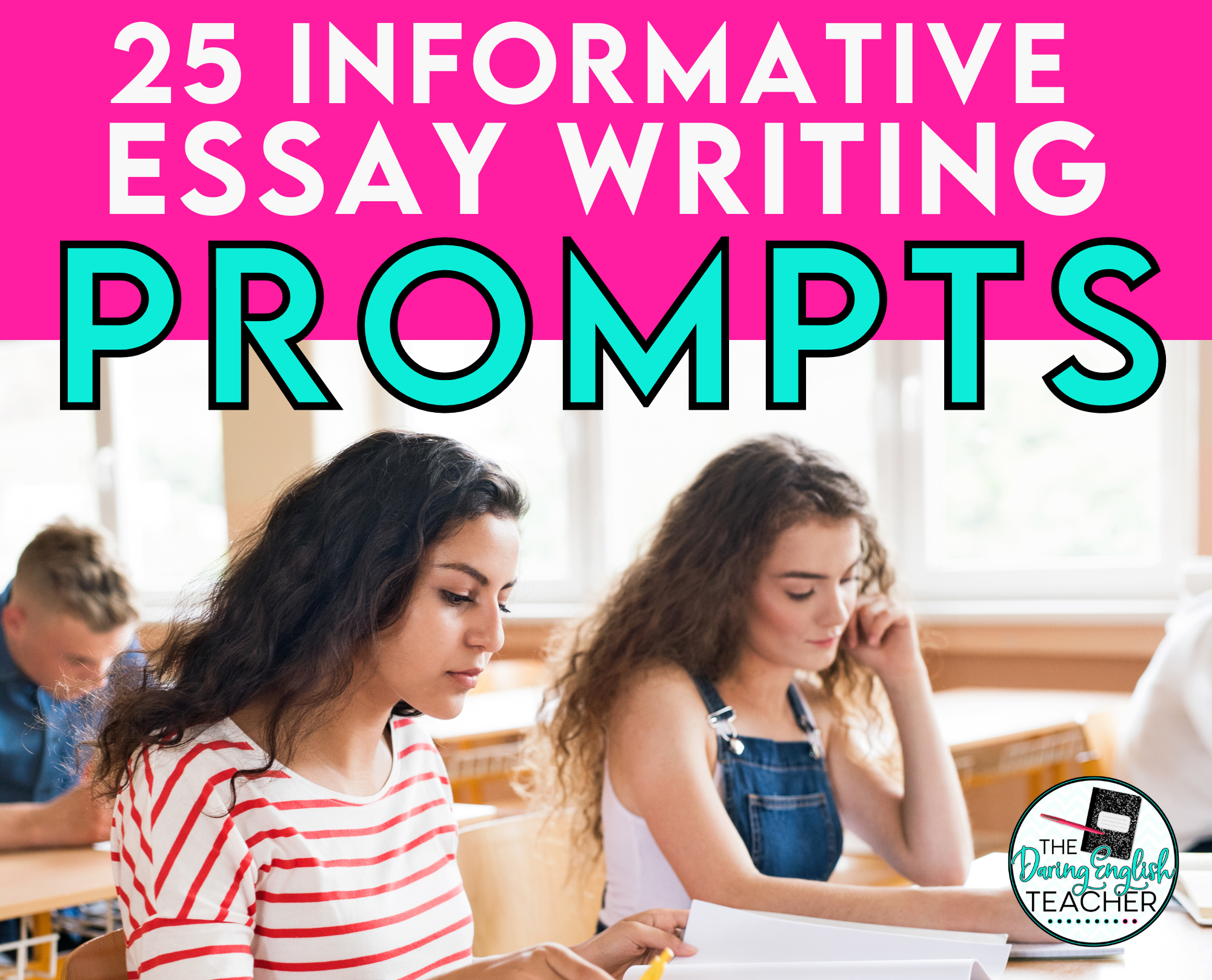
Looking for informative essay writing prompts? I’ve got you covered!
An informative essay is a staple in middle school ELA and high school English classrooms. An informative essay is a type of writing meant to inform the reader about a specific topic. Informative essays are based on facts and evidence and are not meant to persuade or argue a particular point of view.
When I teach informative essay writing to my students, I specify that essays should all be in one tense and written entirely in the third person. To help my students keep their writing in the third person, I like to use this Writing Spotlight: Writing in the Third Person mini-unit alongside my Informational Essay Writing Unit .
I’ve got you covered if you are looking for informational, informative, or explanatory writing prompts to use in your classroom!
Here are 25 informative essay writing prompts to get you started.
- Write an informational essay about the history and significance of a major world event (e.g. the fall of the Berlin Wall, the first moon landing)
- Write an informational essay about the life and accomplishments of a significant historical figure (e.g. Albert Einstein, Mahatma Gandhi)
- Write an informational essay about the causes and effects of a major environmental issue (e.g. climate change, deforestation)
- Write an informational essay about self-driving cars,
- Write an informational essay about an endangered animal and its habitat.
- Write an informational essay about the development and impact of a major scientific or technological breakthrough (e.g. the invention of the internet, the discovery of antibiotics)
- Write an informational essay about the role and importance of a specific branch of government (e.g. the judicial branch, the executive branch)
- Write an informational essay about the effects of a natural disaster (e.g. an earthquake, a hurricane) on a specific community or region
- Write an informational essay about the history and significance of a major cultural movement (e.g. the Harlem Renaissance, the feminist movement)
- Write an informational essay about the impact of social media on communication and relationships
- Write an informational essay about the causes and effects of poverty in a specific region or country
- Write an informational essay about what makes someone a hero.
- Write an informational essay about the impact of globalization on the economy and culture of a specific country or region
- Write an informational essay about the causes and effects of obesity in the United States
- Write an informational essay about the effects of advertising on consumer behavior
- Write an informational essay about the effects of air pollution on human health and the environment
- Write an informational essay about the role and impact of the media in shaping public opinion
- Write an informational essay about three causes of social media addiction
- Write an informational essay about the causes and consequences of cyberbullying
- Write an informational essay about the impact of video games on mental health and social development
- Write an informational essay about how sugar affects the brain
- Write an informational essay about the history and significance of a major world landmark (e.g. the Great Wall of China, the Eiffel Tower)
- Write an informational essay about the role and impact of the arts in society
- Write an informational essay about the effects of music on the brain and behavior
- Write an informational essay about the impact of technology on the education system and learning.
I hope that you find these informative essay writing prompts helpful!
If you are looking for more writing prompts, be sure to check out these additional blog posts:
- 50 Argument Essay Prompts
- Growth Mindset Writing Prompts
- Back-to-School Writing Prompts
Informative Essay Teaching Unit
Engage your students in this informational and expository essay unit that will help them learn how to write academically! This explanatory, expository, and informational writing unit includes everything you need to teach informational and explanatory writing to your middle and high school students. Plus, all of the digital and print materials are included!
What teachers are saying:
⭐️⭐️⭐️⭐️⭐️ Extremely satisfied
“ This is a fantastic resource. The graphic organizers have been amazing for supporting my students as they write essays. The guide says it is for grades 7th through 10th, but I am working with my 6th graders on informative writing and I think these are great resources and tools for them too. Thank you!”
“ Amazing product. This has everything you need to strengthen your student’s writing skills. The Daring English Teacher’s Blog is what I recommend for all my new teacher friends so they can see what a quality lesson includes. The handouts are easy to follow, and slide decks are thoughtfully laid out.”
Leave a Reply Cancel reply
Your email address will not be published. Required fields are marked *
Save my name, email, and website in this browser for the next time I comment.

SUBSCRIBE NOW
Elementary School
Middle school, high school, ets criterion sm library, grade 10 prompts, ws the room (descriptive).
Write a descriptive essay about a room or an area you know well, such as your bedroom or your English classroom. Describe the layout using spatial organization (top to bottom, front to back, left to right). Also include sensory details (sight, sound, smell, touch, and taste) so your reader can “see” the space clearly and understand how the parts relate to each other.
- Scoring Guide 4PT Scale
- Scoring Guide 6PT Scale
WS Point of View (Expository)
The German poet Johann Wolfgang von Goethe said, “There is nothing insignificant in the world. It all depends on the point of view.” Explain why it is important to see a situation from another person’s point of view. Use examples and anecdotes from your own experience to support your viewpoint.
WS Happiness (Expository)
Aristotle once said, “Happiness depends upon ourselves.” Everyone knows the word “happiness,” but most of us have a different idea of what it means to be happy. Write an essay that defines the word “happiness” and include two or three examples either from your own experience or from literature.
WS A Good Job (Expository)
Many high school students have part-time jobs. Students often choose jobs that are based on economical factors and personal preferences. Identify a part-time job that you would like to have, analyze the duties involved, and explain why you believe the job would suit you.
WS Good Parents/Guardians (Expository)
Good parents or guardians demonstrate many valuable qualities that help nurture and raise children effectively. Choose three qualities of a good parent or guardian and write an essay that includes examples to support your choices.
WS Classes (Expository)
In a letter to a friend, compare and contrast two classes that you are currently taking. Write down the positive and the negative aspects of each class, using particular details or experiences from each.
WS Proud Accomplishment (Narrative)
Every person has moments of personal victory or achievement. In an article for your school newspaper, narrate an incident or an accomplishment that made you really proud. Make the experience come alive with vivid details and dialogue.
WS Personal Understanding (Narrative)
Sometimes adults say they attended the “School of Hard Knocks.” They mean that they learned by doing, by working, and by living. In a personal narrative, share a time in your life when you really understood something because you did it yourself. Show some of the “hard knocks” you endured, and clearly indicate what you learned.
WS Teen Licenses (Persuasive)
Your state plans to double license fees for drivers under the age of 18. The money will be used to fund driver-education programs. Write an editorial for your student newspaper supporting or opposing this decision. Use specific reasons and details to argue for your position.
WS Local Produce (Persuasive)
Your school food service wants to buy more produce from local farmers. This food is a bit more expensive, but it is free of pesticides. Write a letter to the food-service director giving your specific reasons for supporting or objecting to the plan.
© 2006 Write Source 35115 West State Street • Burlington, Wisconsin 53105 • Ph: 262-763-8258
Search the blog
Input your search keywords and press Enter.
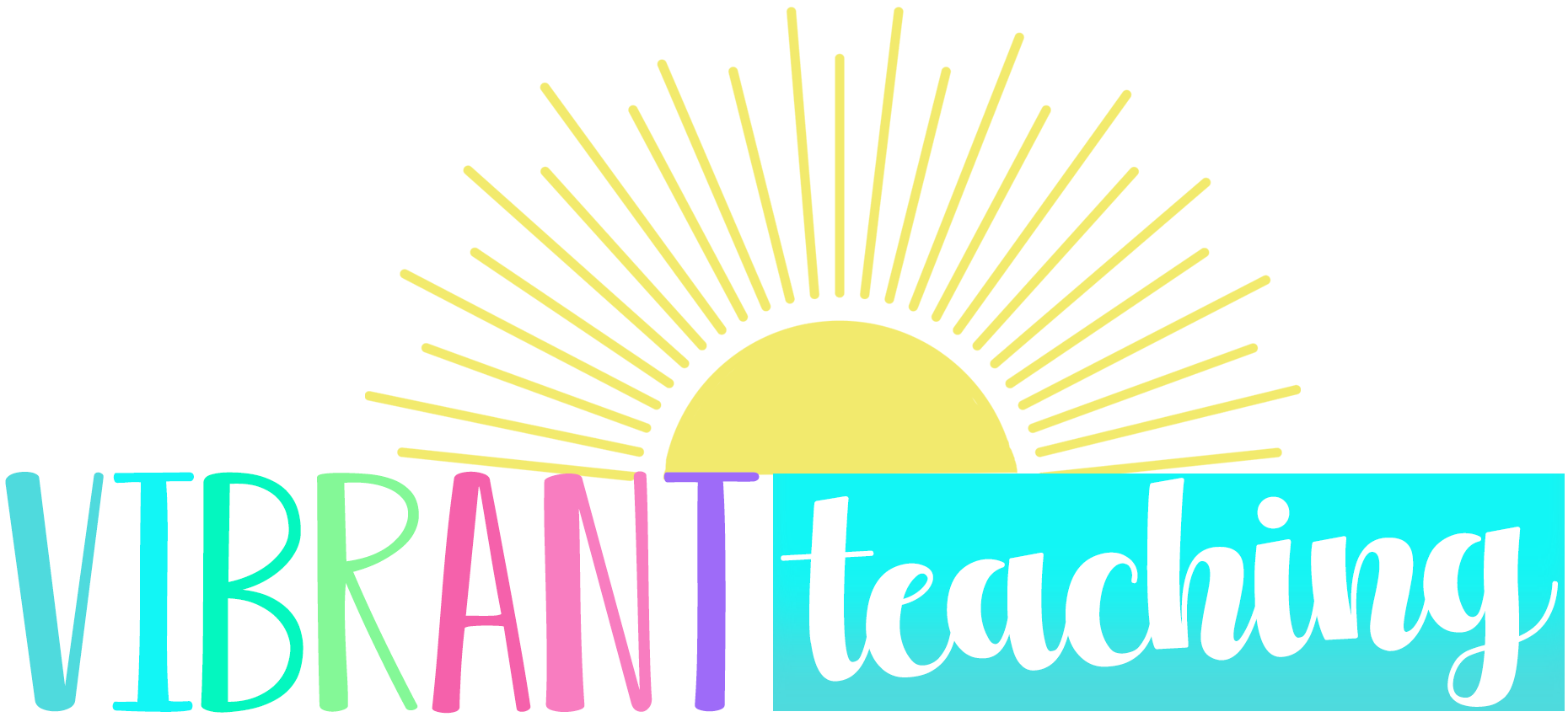
Vibrant Teaching
Teaching Resources Creator and Blogger
20 Prompts for Information Writing That Empower Students
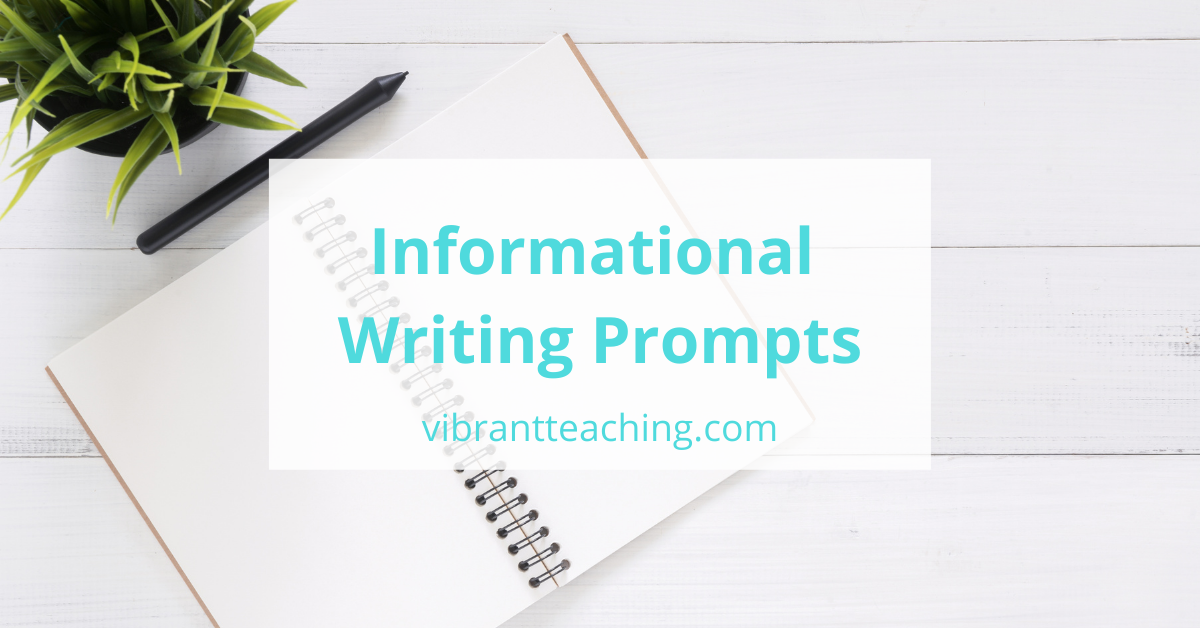
Information writing enables kids to become the expert. They develop skills to inform and teach about a particular topic. Writing prompts are beneficial because they motivate students and help generate ideas. Read on to learn more about mentor texts, ideas, and assessments. Plus you will find 20 informational writing prompts that empower students.
Definition of Informational Writing
Informational writing uses facts to teach about a topic. The main purpose is to inform or explain. This type of non-fiction writing includes text features such as table of contents, headings, captions, diagrams, glossary, and index.
Example of Informational Writing
There are many forms of information writing. It’s beneficial to immerse students in the genre during a unit. Mentor texts can be used when teaching a mini-lesson to model skills and strategies. These books are also helpful as a reference tool for students during writing time. Below is a list of mentor texts to try out in the classroom.
Information Writing Mentor Texts:
- National Geographic Kids Books
- Let’s Read and Find Out Books
- Who Was/Who Is Book Series
- Who Would Win? Book Series
- Gail Gibbons Books
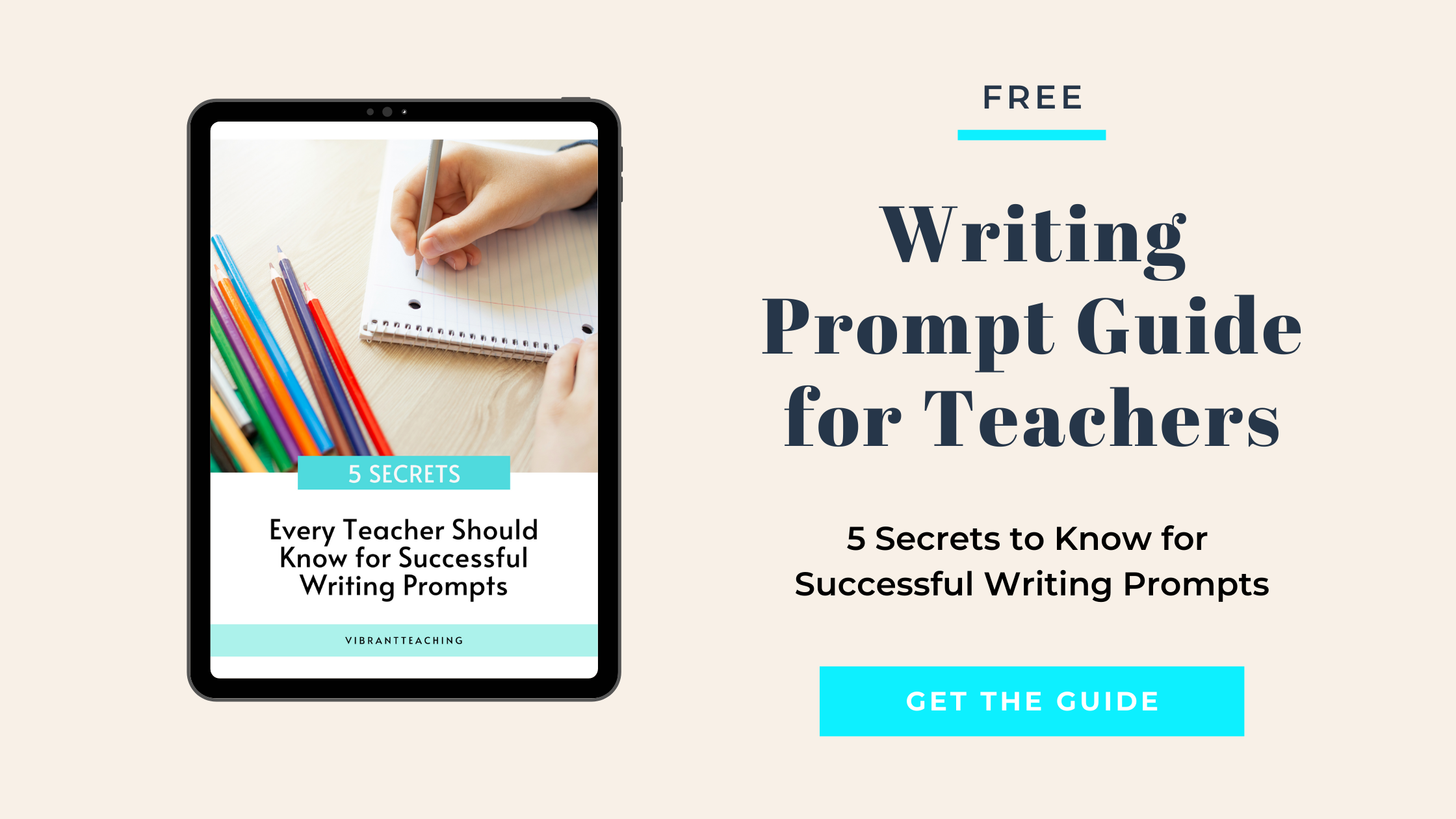
How to Teach Information Writing
1. brainstorm expert topics:.
Students will brainstorm ideas and choose one topic they know a lot about and can be an expert on. Some ideas include a sport, animal, or hobby. Students may even want to discuss ideas at home before choosing a topic.
2. Write Ideas on Paper:
After writers choose a topic, they need to get ideas down on paper. I often have kids do a brain dump. The class sets a timer and students write down everything they know about their topic. It doesn’t have to be organized or look pretty because the content is what matters. This is also a chance for students to see if they have enough information. However, they may need to choose a new topic or do additional research.
3. Organize Ideas:
Students will take their topic and break it down into smaller more focused sections. Each of these sections may become a separate paragraph or chapter later on. Writers can organize this information by saying their topic and touching the palm of their hand. After that, they can list the smaller ideas across their fingers.
4. Create Information Writing:
After all of the planning and preparation, students are ready to start their informational writing piece. There are many different text features that can enhance the writing. Check out the list below.
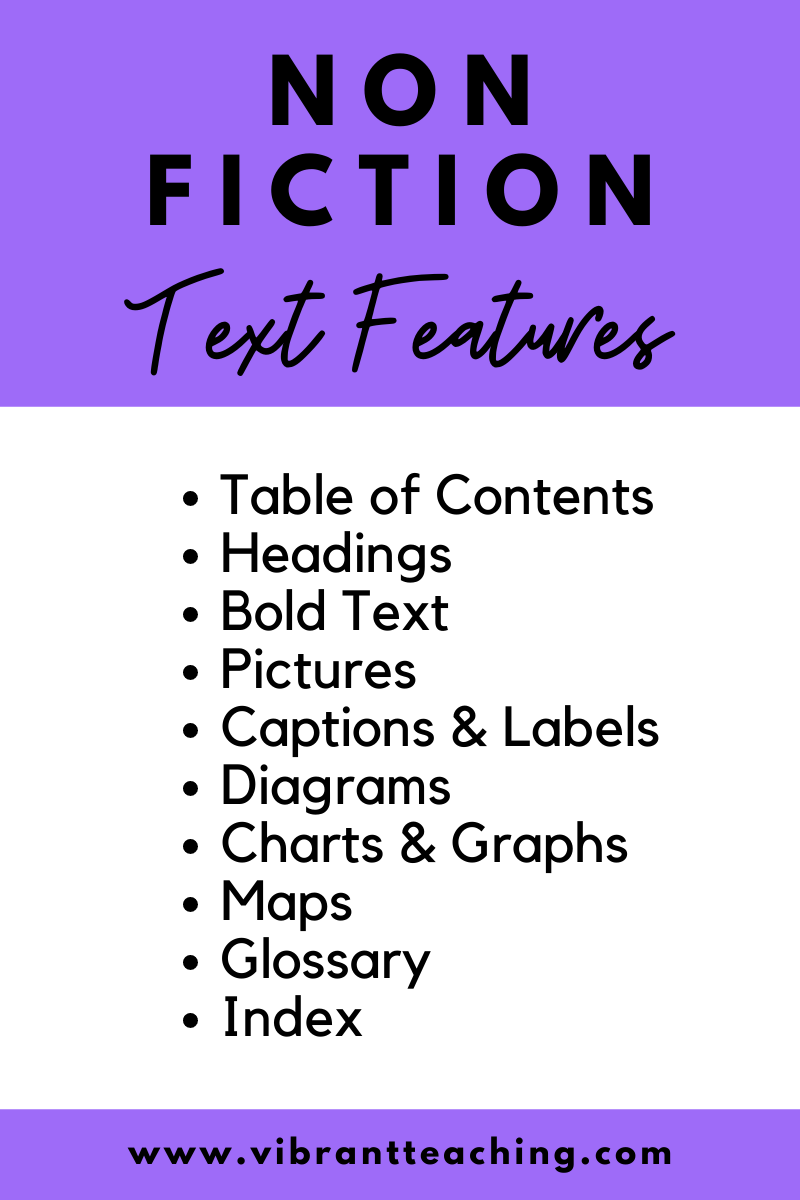
5. Complete Final Copy (optional):
Students can work independently, with a partner, or with the teacher to edit and revise their writing. Checklists and rubrics (see the rubrics section below) are always helpful guides. Most importantly, students should check their work to make sure it contains facts and information instead of opinions.
I like to provide different types of writing paper that match the text features. There are separate pages for the table of contents, glossary, and index. It’s also helpful to have different options of paper with lines and boxes. These picture boxes can show diagrams, charts, graphs, and maps.
Topics for Informational Writing
There are so many great topics for information writing that will enable kids to become the expert. Students can choose something they do really well or know a lot about. Writing prompts effectively help kids generate ideas and get the creative juices flowing more quickly. The list below has 20 empowering prompts that students will love! Also, check out this blog post to learn more about opinion writing prompts: 20 Prompts for Opinion Writing That Motivate Kids
Informational Writing Prompts:
- Choose a pet such as a dog, cat, fish, or hamster. After that, explain how to take care of this pet.
- Imagine someone has never played your favorite game. Explain the steps so they can learn how to play.
- Where could your class go for the best field trip? Choose a place and explain what it has to offer.
- It’s important to keep our Earth clean. Explain 3 or more ways someone can do their part to help the Earth.
- What would it be like to run the school for a day? Explain 3 big changes you would make to your school.
- Explain how to cook or bake your favorite food. Be sure to include some helpful tips.
- Choose a job that’s important and explain what they do at work.
- Compare and contrast the seasons of Summer and Winter. What do they have in common? What makes them so different?
- Explain what you do to get ready in the morning on a school day.
- What kinds of things could you do to cheer someone up if they are sad? Give specific examples.
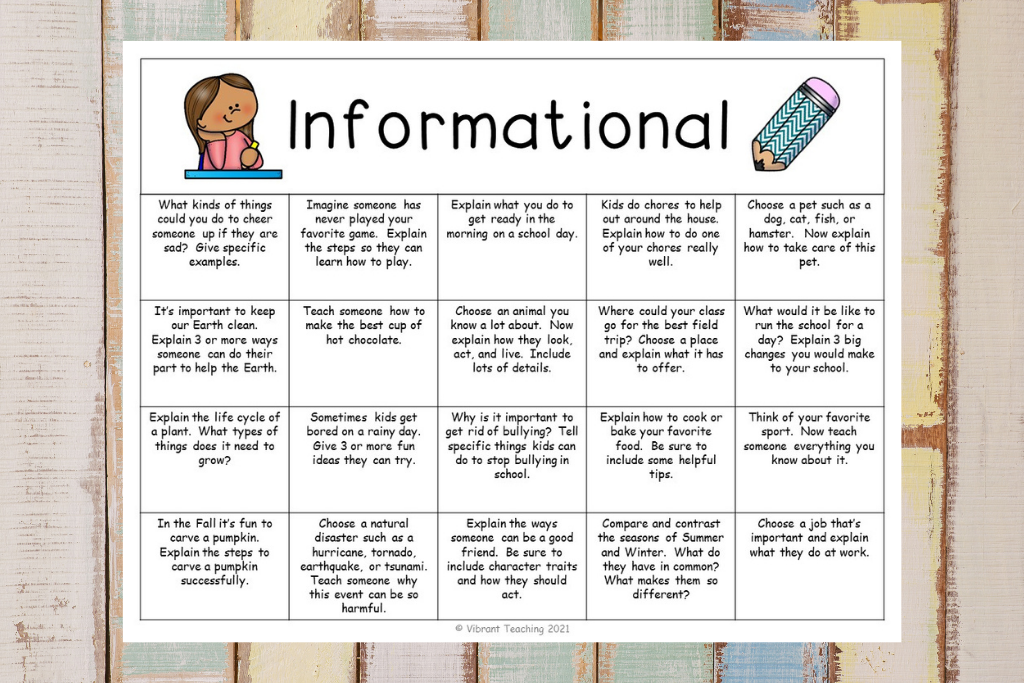
Prompts Continued . . .
- Kids do chores to help out around the house. Explain how to do one of your chores really well.
- Teach someone how to make the best cup of hot chocolate.
- Choose an animal you know a lot about. After that, explain how they look, act, and live. Include lots of details.
- Explain the life cycle of a plant. What types of things does it need to grow?
- Sometimes kids get bored on a rainy day. Give 3 or more fun ideas they can try.
- Why is it important to get rid of bullying? Tell specific things kids can do to stop bullying in school.
- Think of your favorite sport. Now teach someone everything you know about it.
- In the Fall it’s fun to carve a pumpkin. Explain the steps to carve a pumpkin successfully.
- Explain the ways someone can be a good friend. Be sure to include character traits and how they should act.
- Choose a natural disaster such as a hurricane, tornado, earthquake, or tsunami. Teach someone why this event can be so harmful.
Information Writing Rubrics
Rubrics are a helpful resource for both teachers and students. Teachers can ensure accuracy by using rubrics aligned with the standards. Then these assessments can be used for benchmarks, progress reports, report cards, and conferences. Students can benefit by looking at rubrics beforehand to understand expectations and set goals.
Below you will find three types of informational writing rubrics for various grade levels. Each rubric is aligned with the Common Core Standards and has different benefits depending on your needs. Check out this blog post to learn more about student-friendly, teacher-friendly, and time-saving rubrics: 3 Types of Writing Rubrics for Effective Assessments

Information Writing Conclusion
In conclusion, information writing enables students to become the teacher. This really empowers kids and motivates them to do their best writing so they can teach others. One of the best ways to get students engaged and eager to write is by using writing prompts. Writing prompts are perfect for morning work, writing time, centers, or as a homework assignment. Above all, they will save you lots of valuable time and energy. Did you grab your Free Writing Prompt Guide yet? Click the link to get started!
Genre Based Prompts
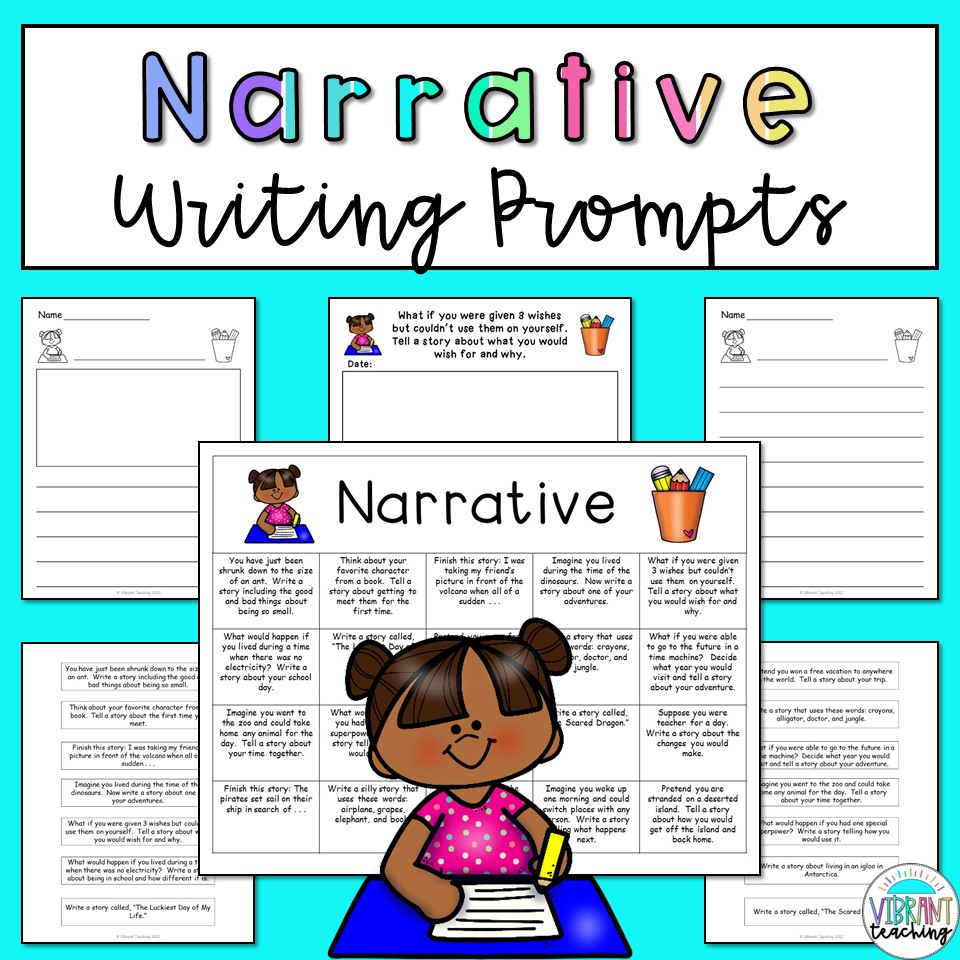
Related Articles:
- 20 Prompts for Narrative Writing That Spark Creativity
- 20 Prompts for Opinion Writing That Motivate Kids
- Informational Writing for Kids: Videos
- Informative Writing in the Classroom, Grades 3-12
Angela Sutton
Related posts.

Helping Students with Back to School Anxiety

3 Distance Learning Tips

Monthly Writing Prompts to Engage Students and Make Writing Fun
No comments, leave a reply cancel reply.
I accept the Privacy Policy

I specialize in helping elementary teachers with writing resources, tips, and ideas. My goal is to save teachers time and energy so they can be vibrant inside and outside of the classroom! Read More
SEARCH THE BLOG
Subscribe to our mailing list.
Get the news right in your inbox!
Health and Wellness
- Grades 6-12
- School Leaders
FREE Poetry Worksheet Bundle! Perfect for National Poetry Month.
70+ Fascinating Informative Essay Topics for Kids and Teens
Tell them what you know.

Informative essays are a chance to show what you know. They’re all about informing the reader, without trying to persuade or offer an opinion. Informative writing can include how-to process essays, biographical writing, an in-depth analysis of a topic, research papers, or compare-and-contrast essays . Just remember to stick to the facts, and be clear and descriptive. These informative essay topics offer something for all interests and ages.
How-To Informative Essay Topics
Social studies informative essay topics, science informative essay topics, pop culture informative essay topics.
Teach your reader the steps or process to:
- Cook a recipe
- Set a table
- Make a quilt
- Change a tire
- Start a recycling program
- Play a game
- Build a birdhouse
- Plant a garden
- Make and care for a compost pile

- Care for an animal
- Start a business
- Catch a fish
- Tie a necktie
- Train for a marathon
- Prepare a campsite
- Make a campfire
- Clean a room
- Wrap a gift
- Plan a party
- Kick a bad habit
- Use social media responsibly
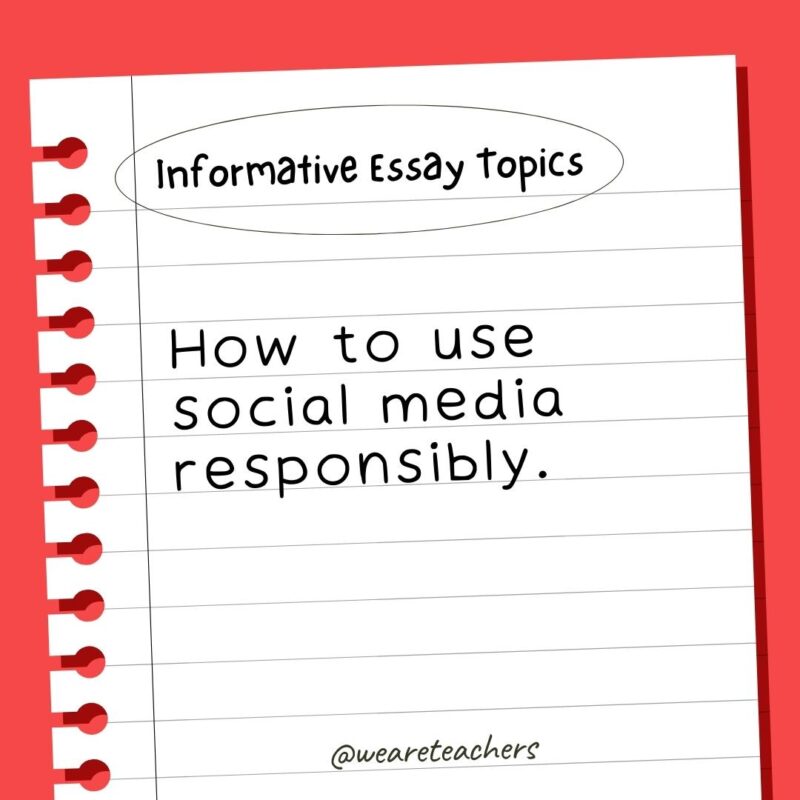
- Manage time effectively
- Make a budget
- Describe the life of a world leader.
- How has the role of women in the workplace changed in the last hundred years?
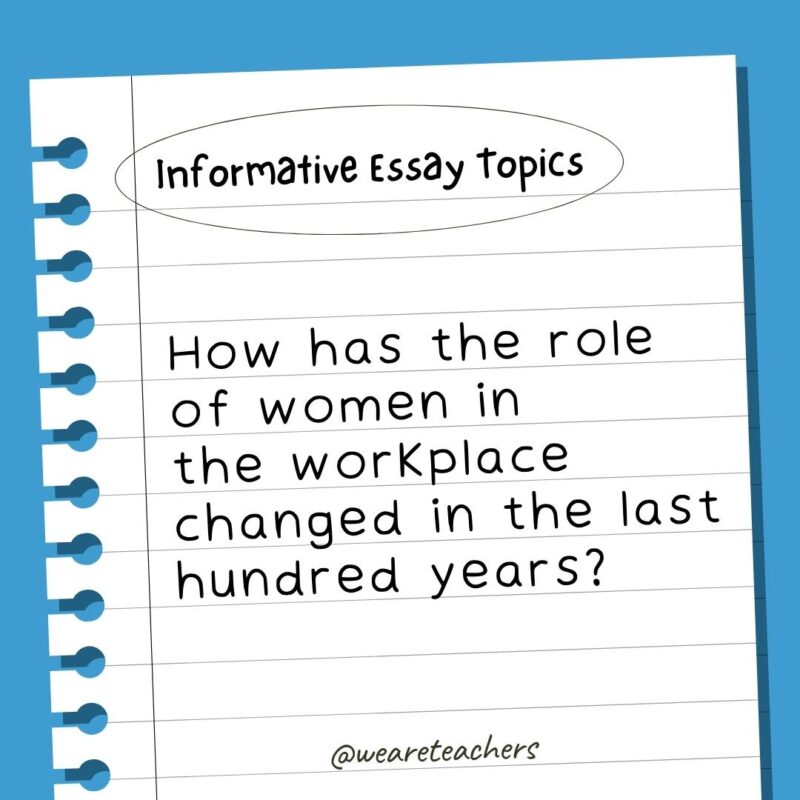
- Explore the current path to becoming an American citizen.
- What are some of the possible ways the pyramids were built?
- Describe a time period in history.
- How does one country’s economy affect another country?
- What is the difference between socialism and communism?
- Explore the benefits and drawbacks of legalizing drugs.
- Describe the political system in a foreign country.
- Explore the causes of a specific war or armed conflict in history.
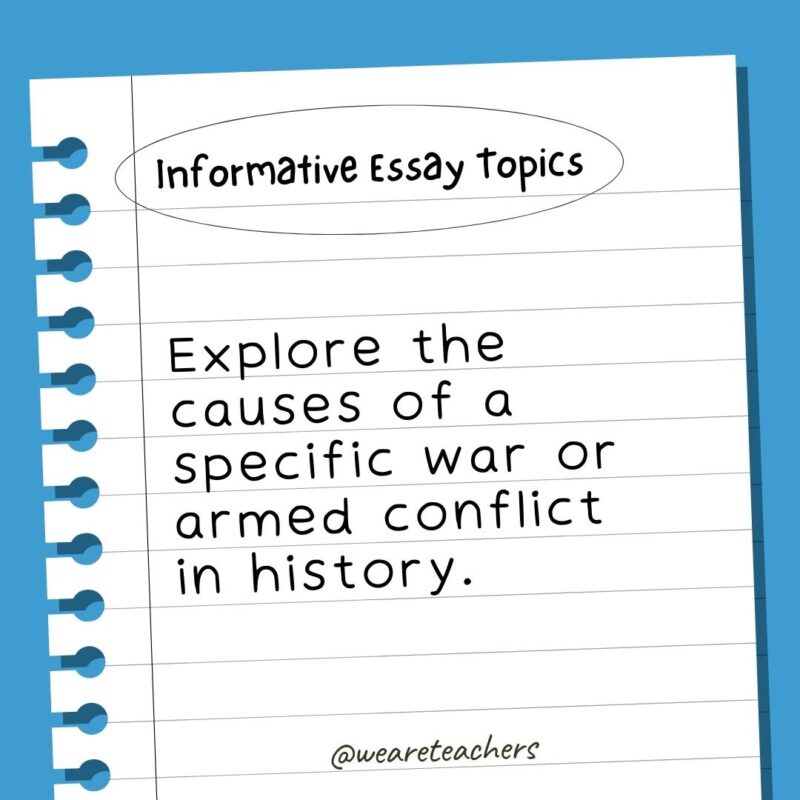
- How is a new law passed in the United States?
- Give an overview of the history of any country, state, or city.
- Describe the three branches of American government.
- Explain how the American judicial system works.
- Describe the evolution of fashion throughout history.
- Describe a science experiment, including the hypothesis, process, and conclusion.
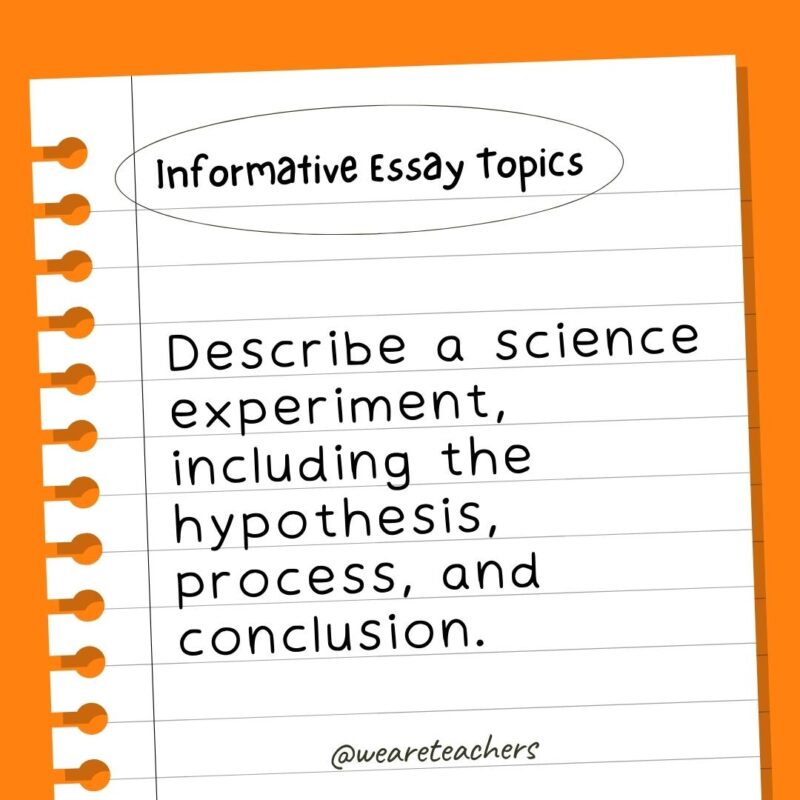
- Explain what it means to lead a healthy lifestyle.
- What is the relationship between calories and fat?
- What is the physics behind a bicycle?
- How do plants convert sunlight into energy?
- Describe any element from the periodic table, including its makeup and uses.
- What is the difference between a crocodile and an alligator?
- Describe the life cycle of any animal.
- What are the benefits of recycling?
- Describe the life of a prominent scientist.
- Explain what E = mc 2 means.
- Describe any disease, including its symptoms and treatments.
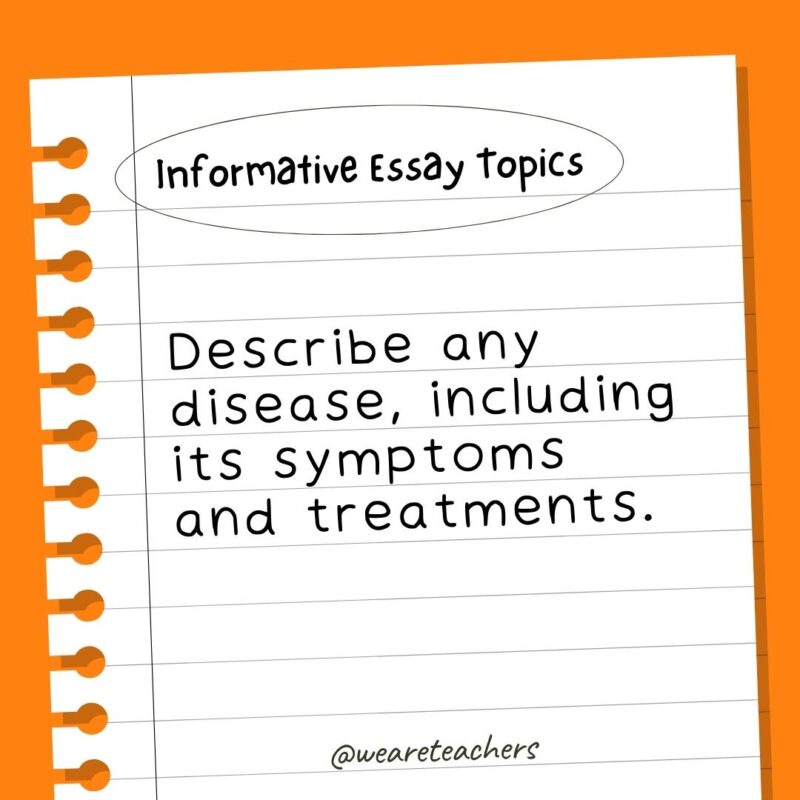
- Why do leaves change color in the fall?
- Explain the difference between climate and weather.
- Describe a specific ecosystem, including the plants and animals that live there.
- Describe the history of video games.
- What are recent trends in the video game industry?
- Describe your favorite superhero.
- Explain the motivations of any fictional villain.
- Describe the life of your favorite celebrity.
- Explore the development and growth of a main character in any book series.
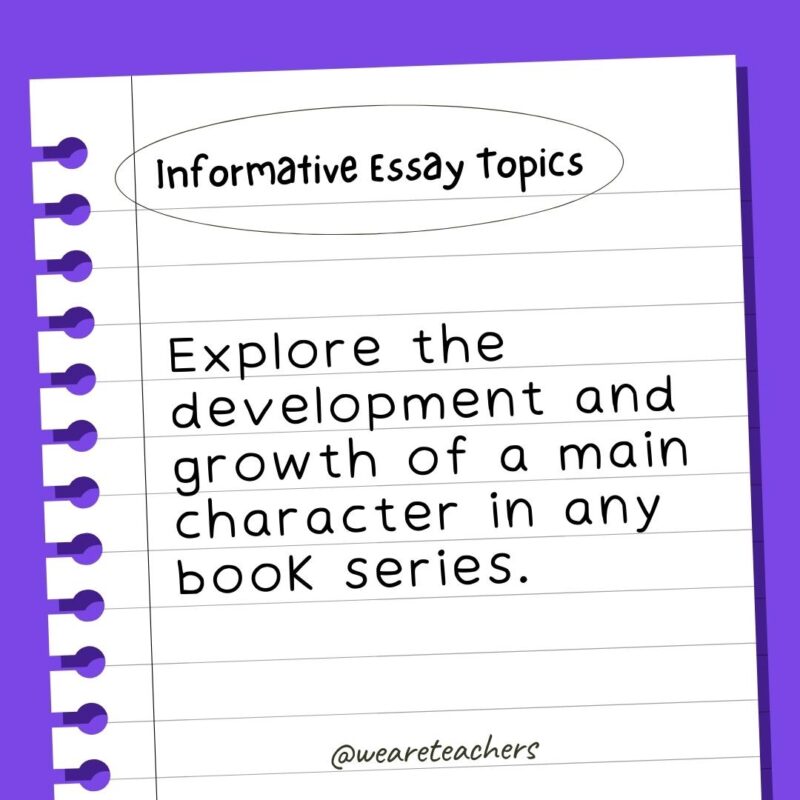
- Describe the process of making a movie or TV show.
- Tell the story of any band, including its founding, successes and challenges, and breakup (if applicable).
- Describe the life of a famous artist.
- Explore the history of Disney World (or any theme park).
- Plan the perfect fantasy football league team.
- Describe popular trends and fads from any decade.
- Explore the history of the Olympics.
- Describe the music of a generation and how it reflected that time.
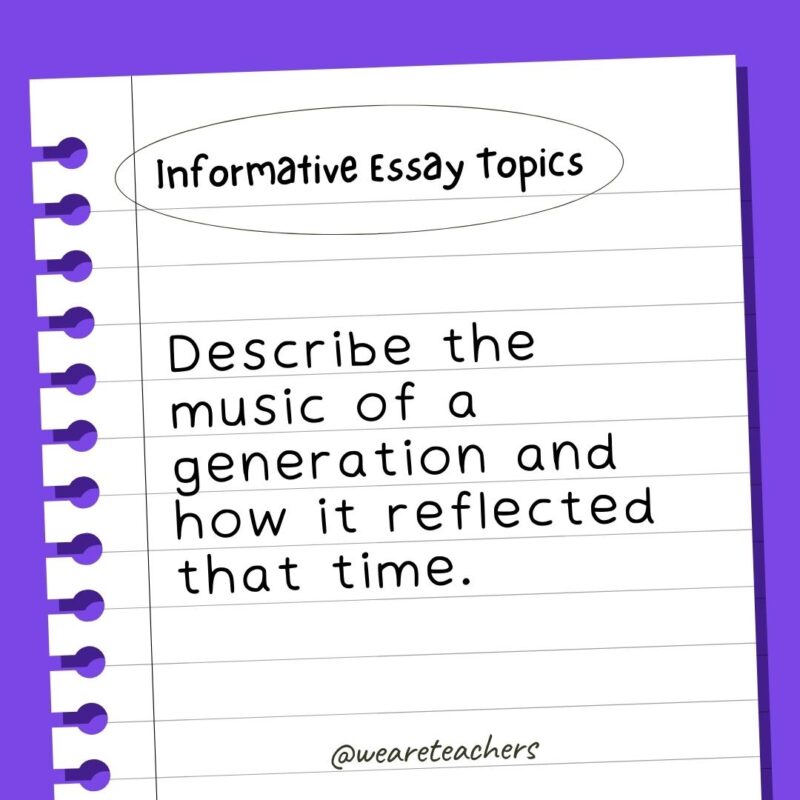
- Explain the history of the internet.
What are some of your favorite informative essay topics? Come share your ideas in the WeAreTeachers HELPLINE group on Facebook .
Plus, check out the big list of essay topics for high school (100+ ideas).
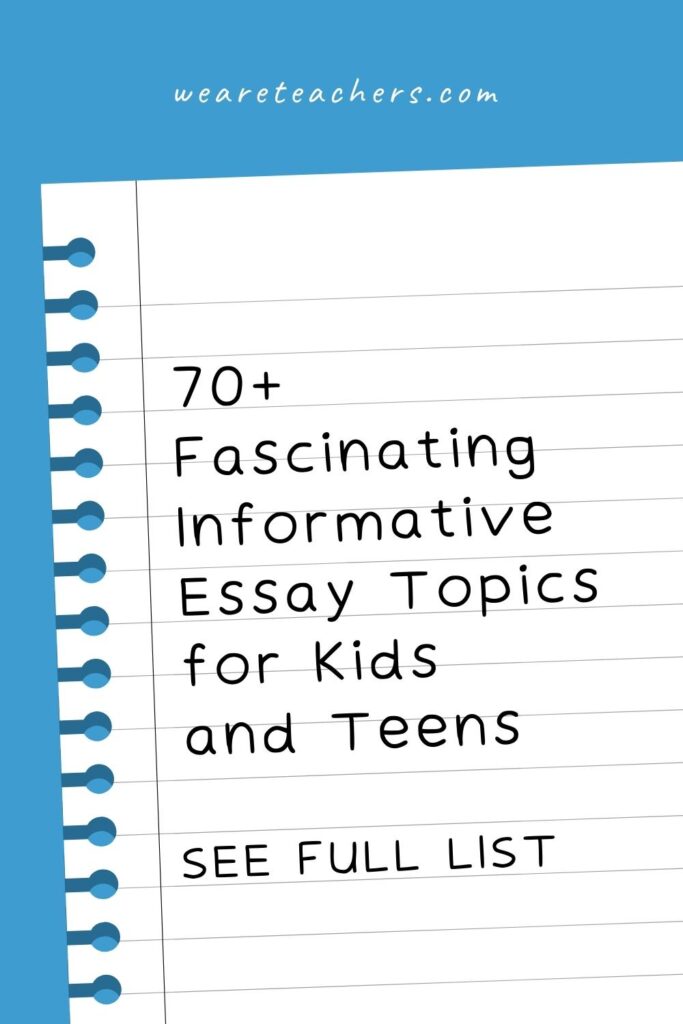
You Might Also Like

The Big List of Essay Topics for High School (120+ Ideas!)
Ideas to inspire every young writer! Continue Reading
Copyright © 2023. All rights reserved. 5335 Gate Parkway, Jacksonville, FL 32256
Prompts for Informative Writing: Boost Your Content with These Essential Tips
By: Author Paul Jenkins
Posted on August 2, 2023
Categories Writing
If you’re a teacher or a parent looking for ways to help your students or children improve their informative writing skills, writing prompts are an excellent tool to consider. Writing prompts are pre-written topics or questions that students can use as a starting point for their writing assignments. They can help students develop their creativity, critical thinking, and research skills while also improving their writing abilities.
Understanding informative writing is crucial when using writing prompts. Informative writing is a type of writing that aims to educate or inform the readers about a specific topic. It’s not meant to express opinions or persuade the readers but rather to provide objective information and facts. Informative writing can take many forms, such as explanatory essays, research papers, reports, and articles, among others.
Types of informative writing prompts can vary depending on the grade level, topic, and purpose of the writing assignment. For example, elementary school students might be asked to write about their favorite animal or describe their typical school day, while high school students might be asked to write a research paper on a particular historical event or scientific phenomenon. Incorporating creativity into informative writing prompts can make the writing process more engaging and fun for students, while also challenging them to think outside the box.
Key Takeaways
- Writing prompts can be an excellent tool to help students improve their informative writing skills.
- Informative writing is a type of writing that aims to educate or inform the readers about a specific topic.
- Types of informative writing prompts can vary depending on the grade level, topic, and purpose of the writing assignment.
56 Prompts for Informative Writing
Here are 56 prompts for informative writing:
1. Explain the process of photosynthesis in plants.
2. Write an informative essay about your favorite hobby or activity.
3. Explain how to train a dog to sit, stay, and come.
4. Describe the water cycle and how water moves through the environment.
5. Explain how electricity is generated and distributed to homes and businesses.
6. Write an informative essay about an important historical event.
7. Explain the rules of your favorite sport or game.
8. Describe how to make a simple meal like a sandwich, salad, or pasta dish.
9. Explain how to open a bank account.
10. Describe the key events and figures of the Civil Rights Movement in America.
11. Explain the process of the scientific method step-by-step.
12. Write an informative essay about an influential person in history.
13. Describe how to change a tire on a car.
14. Explain how to do laundry including sorting, washing, drying and folding clothes.
15. Describe the parts of a flower and their functions.
16. Explain how to read a map and use cardinal directions.
17. Write an informative essay about a specific culture or ethnic group.
18. Describe the steps to take to apply to college.
19. Explain a cooking technique like sautéing, baking, broiling, etc.
20. Describe how to perform cardiopulmonary resuscitation (CPR) in an emergency.
21. Explain how a bill becomes a law in the U.S. government.
22. Write an informative essay about a scientific concept.
23. Describe how to swing a golf club properly.
24. Explain the positions and roles in American football or another sport.
25. Write an informative essay about a historical period like the Renaissance.
26. Describe how to change the oil in a car.
27. Explain the influence of the internet and social media on society.
28. Write an informative essay about an animal species.
29. Describe how daily habits can improve physical and mental health.
30. Explain how clouds and precipitation form in the atmosphere.
31. Write an informative essay about a type of art like painting, music or dance.
32. Describe how to build something out of wood or metal.
33. Explain how volcanoes form and erupt.
34. Write an informative essay about an important current event.
35. Describe how to improve study skills and get better grades.
36. Explain how the human digestive system works.
37. Write an informative essay about an influential book or novel.
38. Describe how to play a musical instrument like guitar, piano or drums.
39. Explain how vaccines help prevent disease in the human body.
40. Write an informative essay about sustainable living practices.
41. Describe how to manage money and create a budget.
42. Explain how radar and satellites are used to forecast the weather.
43. Write an informative essay about a common medical condition.
44. Describe the steps in a software development process.
45. Explain how computers and the internet function.
46. Write an informative essay about social media platforms.
47. Describe how to succeed in a job interview.
48. Explain the causes and effects of climate change around the world.
49. Write an informative essay about a planet in our solar system.
50. Describe how to grow vegetables in a garden.
51. Explain how electricity is produced from renewable sources like solar, wind or hydropower.
52. Write an informative essay about a famous landmark or travel destination.
53. Describe how to change a flat tire on a bicycle.
54. Explain how home appliances like refrigerators and washing machines work.
55. Write an informative essay about healthy eating and nutrition.
56. Describe the proper technique for strength training exercises like squats, deadlifts and bench press.
Understanding Informative Writing
Informative writing is a type of writing that aims to convey information or knowledge to the reader. It is also known as informational or explanatory writing. The purpose of informative writing is to educate the reader on a particular topic or subject. This type of writing is often used in academic, scientific, and technical writing.
Informative writing differs from other types of writing such as narrative and persuasive writing. Narrative writing tells a story, while persuasive writing aims to convince the reader to take a particular action or believe in a certain viewpoint. Informative writing, on the other hand, focuses on presenting facts and information in a clear and concise manner.
To write effective informative writing, you need to have good writing skills. This includes being able to organize your ideas logically, use proper grammar and punctuation, and use clear and concise language. You should also be able to research and gather information from reliable sources.
When writing informative writing, it is important to keep your audience in mind. Consider who will be reading your writing and what they already know about the topic. Use language and terminology that is appropriate for your audience. You should also consider the purpose of your writing and what you want to achieve with it.
In summary, informative writing is a type of writing that aims to educate the reader on a particular topic or subject. It requires good writing skills, research, and an understanding of your audience. By following these guidelines, you can write effective informative writing that conveys information clearly and concisely.
Types of Informative Writing Prompts
When it comes to informative writing prompts, there are a variety of topics that you can choose from. Here are some sub-sections with a few prompts to get you started.
Prompts on Current Events
If you’re interested in writing about current events, here are some prompts to consider:
- The impact of social media on politics
- The effects of climate change on your local community
- The impact of COVID-19 on education
Prompts on Technology
Technology is a constantly evolving field, and there are many interesting topics to explore. Here are some prompts to consider:
- The future of artificial intelligence
- The impact of social media on mental health
- The benefits and drawbacks of remote work
Prompts on Environment
If you’re passionate about the environment, here are some prompts to consider:
- The effects of pollution on your local ecosystem
- The benefits of renewable energy sources
- The impact of deforestation on wildlife
Prompts on Sports
Sports are a great topic for informative writing. Here are some prompts to consider:
- The benefits of team sports for children
- The history of a particular sport
- The impact of sports on mental health
Prompts on History
History is a rich and fascinating topic, and there are many interesting events and people to explore. Here are some prompts to consider:
- The impact of World War II on modern society
- The life and legacy of a famous historical figure
- The history of a particular country or region
Prompts on Family
Family is an important part of many people’s lives, and there are many topics to explore. Here are some prompts to consider:
- The benefits of spending time with family
- The impact of divorce on children
- The role of grandparents in modern families
Prompts on Animals
Animals are fascinating creatures, and there are many topics to explore. Here are some prompts to consider:
- The benefits of pet ownership
- The impact of human activity on wildlife
- The intelligence and behavior of a particular animal species
Prompts on Food
Food is a universal topic, and there are many interesting aspects to explore. Here are some prompts to consider:
- The benefits of a plant-based diet
- The history of a particular cuisine
- The impact of food on mental health
Prompts on Healthy Diet
Healthy eating is an important part of a healthy lifestyle, and there are many topics to explore. Here are some prompts to consider:
- The benefits of a balanced diet
- The impact of sugar on the body
- The benefits and drawbacks of popular diets
Prompts on Music
Music is a powerful art form, and there are many interesting topics to explore. Here are some prompts to consider:
- The impact of music on mental health
- The history of a particular genre of music
- The benefits of learning to play a musical instrument
Prompts on Occupation
Occupation is an important part of many people’s lives, and there are many topics to explore. Here are some prompts to consider:
- The benefits and drawbacks of working from home
- The impact of automation on the job market
- The history of a particular profession
Prompts on Mental Health
Mental health is an important topic, and there are many aspects to explore. Here are some prompts to consider:
- The benefits of mindfulness meditation
- The benefits of therapy for mental health
Prompts on Computers
Computers are an integral part of modern life, and there are many topics to explore. Here are some prompts to consider:
- The impact of social media on privacy
- The history of a particular computer technology
- The benefits and drawbacks of artificial intelligence
Prompts on Holidays
Holidays are a time for celebration and reflection, and there are many topics to explore. Here are some prompts to consider:
- The history and cultural significance of a particular holiday
- The impact of commercialization on holidays
- The benefits of spending time with family during holidays
Prompts on Heritage
Heritage is an important part of many people’s identities, and there are many topics to explore. Here are some prompts to consider:
- The history and cultural significance of a particular tradition
- The impact of globalization on cultural heritage
- The benefits of preserving cultural heritage for future generations
Remember, these are just a few examples of the many topics you can explore in your informative writing. Choose a topic that you’re passionate about, and start exploring!
Informative Writing Prompts for Different Grade Levels
When it comes to informative writing, different grade levels require different prompts. Here are some informative writing prompts for elementary school, high school, and college level students.
Elementary School Prompts
Elementary school students need prompts that are simple and easy to understand. Here are some informative writing prompts that are perfect for elementary school students:
- Describe your favorite animal and explain why you like it.
- Write about a famous person from history and explain why they are important.
- Explain how to make a peanut butter and jelly sandwich.
- Write about your favorite book and explain why you like it.
- Describe your favorite season and explain why you like it.
High School Prompts
High school students need more challenging prompts that require critical thinking and research. Here are some informative writing prompts that are perfect for high school students:
- Explain the causes and effects of air pollution.
- Write about the history of your hometown.
- Explain the process of photosynthesis.
- Write about the effects of social media on society.
- Explain the importance of voting in a democracy.
College Level Prompts
College level students need prompts that are even more challenging and require extensive research. Here are some informative writing prompts that are perfect for college level students:
- Explain the causes and effects of climate change.
- Write about the history of a specific industry and its impact on society.
- Explain the process of genetic modification.
- Write about the effects of globalization on the economy.
- Explain the impact of technology on modern society.
No matter what grade level you are in, these informative writing prompts will help you improve your writing skills and expand your knowledge on a variety of topics.
Incorporating Creativity into Informative Writing
When it comes to informative writing, it’s easy to fall into the trap of writing dry, boring content that fails to engage readers. However, incorporating creativity into your writing can make it more interesting and engaging. Here are some creative ways to make your informative writing more interesting:
Use Writing Prompts
Writing prompts are a great way to get your creative juices flowing. They can help you come up with interesting topics and ideas that you may not have thought of otherwise. There are many websites and books that offer writing prompts for informative writing. Some of these prompts may be specific to a particular topic, while others may be more general.
Think Outside the Box
Sometimes, the most interesting and engaging informative writing comes from thinking outside the box. Instead of writing about the same old topics, try to find a unique angle or perspective that will make your content stand out. For example, instead of writing a typical “how-to” article, you could write a “how-not-to” article that highlights common mistakes people make.

Use Visuals
Visuals are a great way to make your informative writing more engaging. They can help break up large blocks of text and make your content more visually appealing. Consider using charts, graphs, and images to help illustrate your points. Just be sure to use visuals that are relevant to your content and don’t overload your readers with too many images.
Tell a Story
People love stories, and incorporating storytelling into your informative writing can make it more interesting and engaging. Instead of simply presenting facts and information, try to tell a story that illustrates your points. For example, if you’re writing about a historical event, you could tell the story of a person who lived during that time period and how the event affected their life.
Incorporating creativity into your informative writing can make it more interesting and engaging for your readers. By using writing prompts, thinking outside the box, using visuals, and telling stories, you can create informative content that is both informative and engaging.
Tips for Teaching Informative Writing
Teaching informative writing can be a challenging task, but with the right approach, you can help your students become confident and skilled writers. Here are some tips for teaching informative writing:
1. Start with Mentor Texts
Before asking your students to write in a new genre, immerse them in it. Start with mentor texts that exemplify the genre, and use them to teach the text structure, language features, and text purpose. This will help your students develop a better understanding of the genre and the expectations for their writing.
2. Break it Down
Informative writing can be overwhelming for students, especially if they are new to the genre. To make it more manageable, break the writing process down into smaller steps. Start with brainstorming, move on to research, and then focus on organizing and drafting the writing. This will help your students stay focused and motivated throughout the writing process.
3. Use Engaging Prompts
To help your students get excited about writing, use engaging prompts that relate to their interests and experiences. This will make the writing more meaningful and relevant to them, which can help improve their motivation and engagement.
4. Provide Feedback
Feedback is essential for helping your students improve their writing skills. Be sure to provide constructive feedback that is specific and actionable. This will help your students understand what they are doing well and what they need to work on.
5. Use Resources
There are many resources available to help you teach informative writing, including lesson plans, teaching guides, and online teacher hubs. Take advantage of these resources to help you plan your lessons and support your students’ learning.
By following these tips, you can help your students become confident and skilled writers of informative texts.
Writing Prompts for Special Topics
When it comes to informative writing, there are many special topics that you can explore. These topics can be used to educate your readers on a variety of subjects and help them learn more about the world around them. In this section, we will provide you with some writing prompts for special topics that you can use to get started.
Prompts on Natural Disasters
Natural disasters can be devastating and have a significant impact on people’s lives. If you want to write about natural disasters, here are some prompts that you can use:
- How do natural disasters occur?
- What are the different types of natural disasters?
- What are some of the most significant natural disasters in history?
- How can people prepare for natural disasters?
- What are some of the most common effects of natural disasters on people and the environment?
Prompts on Famous Landmarks
Famous landmarks are an essential part of our world’s history and culture. If you want to write about famous landmarks, here are some prompts that you can use:
- What are some of the most famous landmarks in the world?
- What is the history behind these landmarks?
- How have these landmarks impacted the world?
- What are some of the most interesting facts about these landmarks?
- What are some of the challenges that these landmarks face today?
Prompts on Social Issues
Social issues are a crucial part of our society, and they can have a significant impact on people’s lives. If you want to write about social issues, here are some prompts that you can use:
- What are some of the most pressing social issues in our society today?
- How do these social issues impact people’s lives?
- What are some of the most effective ways to address these social issues?
- How can people get involved in addressing these social issues?
- What are some of the challenges that people face when addressing these social issues?
Prompts on Self-Care
Self-care is essential for maintaining our physical, mental, and emotional well-being. If you want to write about self-care, here are some prompts that you can use:
- What is self-care, and why is it important?
- What are some of the most effective self-care practices?
- How can people incorporate self-care into their daily lives?
- What are some of the benefits of self-care?
- What are some of the challenges that people face when practicing self-care?
Prompts on Bullying
Bullying is a serious issue that can have a significant impact on people’s lives. If you want to write about bullying, here are some prompts that you can use:
- What is bullying, and how does it impact people?
- What are some of the different types of bullying?
- What are some of the most effective ways to prevent bullying?
- How can people support those who have been bullied?
- What are some of the challenges that people face when addressing bullying?
These writing prompts can help you get started on your informative writing journey. By exploring these special topics, you can educate your readers and help them learn more about the world around them.
Improving Writing Skills Through Prompts
If you want to improve your writing skills, prompts for informative writing can be an effective tool. Informational writing prompts can help you develop your communication skills, learn how to compare and contrast different ideas, write descriptive pieces, and provide clear directions.
One of the benefits of using prompts is that they can help you overcome writer’s block. When you have a specific topic or idea to write about, it can be easier to get started. Prompts can also help you stay focused and on track, preventing your writing from becoming too broad or unfocused.
Using prompts can also help you develop your writing skills in specific areas. For example, if you struggle with descriptive writing, prompts can give you an opportunity to practice using sensory details and vivid language. If you want to improve your ability to compare and contrast different ideas, prompts can provide you with opportunities to analyze and evaluate different topics or concepts.
Another benefit of using prompts is that they can help you develop your critical thinking skills. When you are asked to write about a specific topic, you may need to do some research or think deeply about the subject in order to provide accurate and informative content.
To get the most out of prompts, it’s important to choose ones that are relevant to your interests and goals. Look for prompts that challenge you to think deeply and critically, and that provide opportunities for you to develop your writing skills in specific areas.
Overall, using prompts for informative writing can be an effective way to improve your writing skills, develop your communication abilities, and learn how to provide clear and effective directions. With practice and dedication, you can become a skilled and confident writer who is able to express your ideas clearly and effectively.
The Role of Research in Informative Writing
When writing an informative piece, research plays a crucial role in providing factual information that is relevant to the topic. Research helps you to gather information from different sources, including books, articles, and websites, that you can use to support your claims and add credibility to your writing.
Conducting research allows you to collect a wide range of information that you can use to provide a comprehensive overview of the topic you are writing about. This information may include statistics, historical facts, expert opinions, and personal experiences, among others.
It’s important to ensure that the information you gather is factual and relevant to the topic you are writing about. This means that you need to be selective about the sources you use and ensure that they are reputable and reliable. You can use tools like Google Scholar or academic databases to find scholarly sources that provide accurate and up-to-date information.
When using information from your research, it’s essential to cite your sources properly. This adds credibility to your writing and allows readers to verify the information you have presented. You can use citation styles like APA or MLA to ensure that you cite your sources correctly.
In summary, research is a critical component of informative writing. It helps you to gather factual information that is relevant to your topic and adds credibility to your writing. By conducting thorough research and citing your sources correctly, you can provide readers with accurate and reliable information that they can trust.
Frequently Asked Questions
What are some examples of informative writing prompts.
Informative writing prompts are designed to teach readers about a particular topic or subject. Some examples of informative writing prompts include explaining how a bicycle works, describing how a plant grows, or writing a biography of a famous person.
What are the key features of informative writing?
Informative writing should be clear, concise, and organized. It should include a thesis statement that clearly identifies the main topic of the piece, and each paragraph should focus on a specific aspect of that topic. Informative writing should also include evidence and examples to support the author’s claims.
What are the most important elements of informative writing?
The most important elements of informative writing are a clear thesis statement, well-organized paragraphs, and supporting evidence and examples. Informative writing should also be written in a clear and concise style, with a focus on teaching the reader about a particular topic.
What are some good informational writing topics for 6th grade?
Good informational writing topics for 6th grade include current events, historical events, scientific concepts, and social issues. For example, students could write about climate change, the Civil Rights Movement, the human digestive system, or the effects of social media on teenagers.
You are using an outdated browser and it's not supported. Please upgrade your browser to improve your experience.
- LOGIN FOR PROGRAM PARTICIPANTS
- PROGRAM SUPPORT
Informative Writing
Description.
In this unit, students are introduced to the skills, practices, and routines of informative writing by working collaboratively with their peers to examine informative writing models, plan for their writing, and gather evidence. Students independently practice writing and revising and also engage in peer review to revise their work. Throughout the unit, the class will construct an Informative Writing Checklist, which students will use to guide their drafting, review, and finalization. By the end of the unit, students will have produced fully developed informative papers.
There may be cases when our downloadable resources contain hyperlinks to other websites. These hyperlinks lead to websites published or operated by third parties. UnboundEd and EngageNY are not responsible for the content, availability, or privacy policies of these websites.
- Grades 9-10 Writing Module, Unit 2
- Writing Module Unit 2 Overview
- Cave Painting
- Photography
- Text Firing, Not Hiring
- The New Deal
In This Unit
- lesson 1: Introduction to Informative Writing
- lesson 2: Effective Informative Writing: Purpose and Audience
- lesson 3: Informative Writing: Analyzing the Prompt
- lesson 4: Informative Writing: Charting Topics, Subtopics, Claims, and Evidence
- lesson 5: Informative Writing: More Subtopics and Evidence
- lesson 6: Informative Writing: Processing the Information
- lesson 7: Informative Writing: Drafting an Outline
- lesson 8: Informative Writing: Drafting Body Paragraphs
- lesson 9: Informative Writing: Drafting an Introduction
- lesson 10: Informative Writing: Drafting a Conclusion
- lesson 11: Informative Writing: Getting Feedback
- lesson 12: Finalizing Informative Papers
- lesson 13: Informative Writing: Reflecting on the Writing Process
Related Guides and Multimedia
Our professional learning resources include teaching guides, videos, and podcasts that build educators' knowledge of content related to the standards and their application in the classroom.
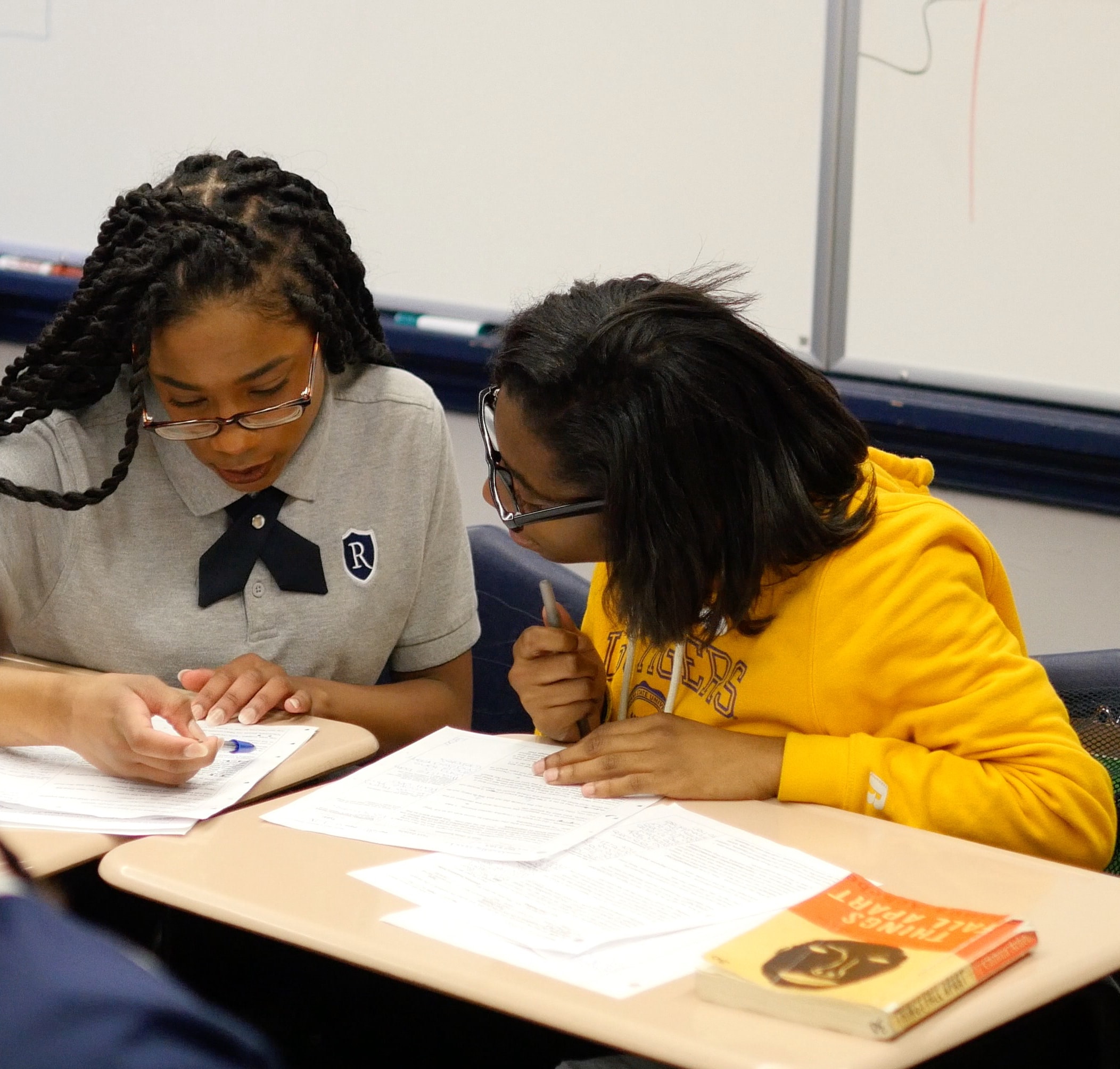
Building Fluency: Unbound A Guide to 6-12 ELA/Literacy Practices
- See All Guides
Resource List
B.e.s.t. writing scoring samplers.
The Benchmarks for Excellent Student Thinking (B.E.S.T.) Writing Scoring Samplers can be used as a resource regarding the scoring of student responses on the Writing assessment. In each sampler, examples of student responses represent various combinations of the score points across the scoring domains. As a basis for developing a common understanding of the scoring criteria, an annotation follows the response to explain the prominent characteristics of the response described in the rubric. These responses are not intended to provide a full spectrum of examples for each score point in each domain. Moreover, they do not necessarily represent the highest or lowest example of each score point in each domain. The applicable rubric and corresponding prompt and text set are also included in each sampler.
2022 Grade 4 B.E.S.T. Writing Scoring Sampler
2022 grade 5 b.e.s.t. writing scoring sampler, 2022 grade 6 b.e.s.t. writing scoring sampler, 2022 grade 7 b.e.s.t. writing scoring sampler, 2022 grade 8 b.e.s.t. writing scoring sampler, 2022 grade 9 b.e.s.t. writing scoring sampler, 2022 grade 10 b.e.s.t. writing scoring sampler.
- Teachers and Test Administrators
- After Testing
- ELA Writing
Reading Worksheets, Spelling, Grammar, Comprehension, Lesson Plans
Informative / Expository Writing Prompts
Expository writing, sometimes called informative writing, seeks to relay information to the reader. It is one of the main modes of writing and includes such formats as reports, instructions, term papers and even business letters. Since this is the type of writing that most students will use in their adult lives, it is important that they learn to convey information clearly and concisely. To use the expository worksheets below, click on the title. You may then view the details and download it for free for home use or the classroom. Check out all of our writing prompts .
An Interesting Animal – Writing Prompt
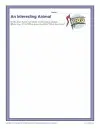
Your student will practice informative writing with this worksheet.
Something Green
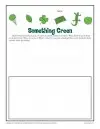
In this writing worksheet, your student will write about something green.
Write About a State

In this worksheet, your student can practice writing informational text.
My Hometown – Writing Prompt

This writing prompt has your student writing an informative piece on her hometown.
A Local Organization

This writing worksheet will help your student with informational writing.
Rules of the Game – Writing Prompt

Your student will practice informative writing in this worksheet about explaining the rules of a game.
Two People in History – Writing Prompt
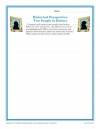
This worksheet on informative writing asks your student to compare two people in history.

Opinion and Informational Text Sets: Reading and Writing from One Text Set (+ a Freebie)
This past year I have been wrapping up a project that has been quite the labor of love: Monthly Text Sets. The monthly text sets solve a list of problems I consistently ran into when teaching 4th Grade ELA. But first, what are the monthly text sets? The monthly text sets are a set of nonfiction passages based around one topic. Students use the passages/articles to write in response to reading. The text set includes an opinion or informational writing prompt and reading comprehension questions. This means that you can use ONE set of texts to teach both reading and writing.
What does each monthly text set include?
- 2 – 3 Nonfiction Passages based around one topic
- Comprehension Questions aligned to standards
- Writing Prompt for Opinion or Informational Text-based writing in response to reading
- Graphic Organizer for Students
- Teacher Model Graphic Organizer
- Teacher Model Essay
- Differentiated for Grades 3-5
Reading Comprehension
Each text set includes 2 – 3 passages/articles (texts). They are nonfiction topics and the texts are differentiated for grades 3-5. The 4th and 5th grade articles sometimes remain the same, but the questions are different for each grade level. The questions follow the type of questions students might see on a state test such as the Florida State Assessment, and are aligned to the Common Core State Standards. Even if your state doesn’t exactly follow common core standards and they have their own, the questions are based on skills as well such as main idea, text structure, cause and effect, etc.

You can see examples of the question types below. Each grade level is included. I kept it this way so that even if you teach another grade level, you can differentiate for your students if needed. Don’t forget to grab this free shark text set before you go! Click here or on any of the images.
3rd Grade Reading Comprehension

4th Grade Reading Comprehension

5th Grade Reading Comprehension

You will also get a link that gives you access to the Standards Alignment Google Sheet. This way you can keep track of which standards each text set is covering. If you wanted to cover a specific skill, you have an easy way to track and access which standards are covered in which text set.
The writing portion includes a prompt in which students will write using both texts to respond. The prompt for this text set is an informational writing prompt:
Write an essay in which you explain the importance of sharks in the ocean ecosystem.

If you are familiar with my writing units, then you know that boxes and bullets are the standard around here. I have a lot of thoughts about that, but the gist is that they are so simple and provide a consistent structure for your students. Each text set includes a boxes and bullets graphic organizer for students and a teacher example to model or guide your students. Depending on where you are in your writing instruction, you can also have students do this in their notebook.

Writing paper is also included for a final published piece. Depending on how long you have and/or if you are in test-prep mode, you may choose to have students write a rough draft on notebook paper or in their writing notebook and then write a final copy on the publishing paper. Then, display in your classroom or hallway for the world to see all of your students’ amazing writing!
The plan and example essay includes 2-3 body paragraphs. So your students will be writing 4 – 5 paragraph essays. Depending on which you prefer to have your students write, you’ll just add/remove a body paragraph.
- Paragraph 1: Introduction
- Paragraph 2: Body Paragraph 1
- Paragraph 3: Body Paragraph 2
- Paragraph 4: Conclusion
There is also an editable teacher plan and essay available as a PowerPoint and Google doc so that you can edit and adapt the essay to your needs.
You might also use a Google Doc/PowerPoint to write the essay with your students and use the example as a guide.

What are the topics for each month?
One of my favorite parts about these text sets is that they have a monthly theme. HOWEVER, most topics can be used at any point in the year. Some topics are month-specific such as “Martin Luther King, Jr. Day” in January and “The Benefits of Bees” in April (it mentions Earth Day), but you can definitely fit these into to your current curriculum. And I have to tell you that even though all 12 months have been released, we’re still creating these each month.
- January: MLK Day (Opinion Writing Prompt) → Read the blog post here.
- February: Equality in Education: Mary McLeod Bethune and Thurgood Marshall (Informational Writing Prompt)
- March: Ants: Perk or Pest? (Opinion Writing Prompt)
- April: The Benefits of Bees (Informational Writing Prompt)
- May: Save the Sea Turtles (Informational Writing Prompt)
- June: Shark Shenanigans (Informational Writing Prompt) Grab this one for FREE here or at the end of this post.
- July: Hurricanes (Informational Writing Prompt)
- August: Video Games: Helpful or Harmful? (Opinion Writing Prompt)
- September: Homework: Helpful or Harmful? (Opinion Writing Prompt)
- October: Bats: Benefit or Bother? (Opinion Writing Prompt)
- November: Paid to Play: Should College Athletes be Paid? (Opinion Writing Prompt)
- December: Polar Bear Problems (Informational Writing Prompt)

WHY use monthly text sets?
Let’s talk about WHY you might want to use text sets in your classroom. While teaching 4th grade in a self-contained classroom, I consistently felt like we were giving our students too many texts to grapple with. At any point in time, we juggled some (and sometimes ALL ) of the following texts:
- Read Aloud (chapter book)
- Read Aloud (picture book)
- Writing Mentor Text (picture book)
- Reading Text Sets (passages as part of a center or independent practice)
- Guided Reading Text (small groups)
- Shared Reading Text (textbook used in whole groups or small groups)
(This is JUST for Reading)
- Writing Text Sets for test prep or writing in response to reading (In 4th and 5th Grade, this was ALLLLL the time.)
- Science Textbook
- Social Studies Text
When you list it out like that, it’s a LOT of texts. And they all serve a purpose. And they’re all important. But we continuously ran into problems.
❌We couldn’t fit them all in. (Shocking, right?)
❌We felt behind or overwhelmed because we were trying to do too much and unable to get in #allthethings.
❌Science and social studies were not getting the time they deserved. And honestly, I don’t think the future of our world can afford to not make science and social studies a priority.
The bottom line is we were trying to use TOO. MANY. TEXTS. One big issue that I began to see is that we treated the texts that we were using for writing as if we didn’t have to actually read them. As if we didn’t have to read them closely, dissect, analyze, and synthesize to produce a clear and concise essay with a controlling idea, supporting details, voice, etc. And, of course, in a way that did not copy the text. You and I both know that’s a lot to ask of a 4th grader (or 3rd grader or 5th grader or quite frankly – an adult.)
There had to be a better way. So I decided to ELIMINATE or INTEGRATE.
✅Eliminate the texts that we didn’t need to use, that didn’t support other content area standards or that didn’t offer high-engaging content or just weren’t the best quality of texts in the first place. If my students weren’t interested in it and it didn’t align to other content area standards – I needed to find better texts.
✅ Integrate Science and Social Studies into our ELA curriculum.

How do the monthly text sets fit into this?
Each monthly text set can be used for both Reading and Writing. The topic of each text set is either high-engaging or supports Social Studies/Science standards. It may not directly align with science or social studies standards, but topics support those areas. For example, many of the animal topics discuss life cycles and roles in the ecosystem.
HOW do I teach writing using the text sets?
If you’re looking for more support in teaching writing, then you may be interested in the complete writing units . Both the informational and opinion writing unit include daily lesson plans, PowerPoints that help you navigate writing workshop.
Are you ready to try the monthly text sets?
If you’re ready to give the monthly text sets a try in your classroom, you can grab the Sharks Text Set freebie by clicking on the button below.

Just click here or on the image below to snag them.

Jump to navigation
- Inside Writing
- Teacher's Guides
- Student Models
- Writing Topics
- Minilessons
- Shopping Cart
- Inside Grammar
- Grammar Adventures
- CCSS Correlations
- Infographics
Get a free Grammar Adventure! Choose a single Adventure and add coupon code ADVENTURE during checkout. (All-Adventure licenses aren’t included.)
Sign up or login to use the bookmarking feature.
15 Engaging Explanatory Writing Prompts
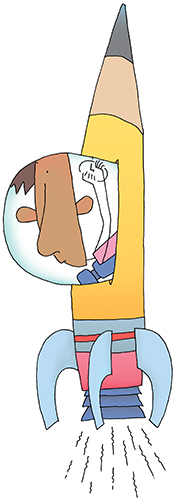
When you want your students to practice explanatory writing, present them with one or more of the following prompts, grouped by difficulty. You can also introduce students to the PAST strategy to help them understand what each explanatory prompt is asking them to do.
Beginning Explanatory Prompts (Grades 4–5)
The following explanatory prompts are meant for students who are moving from paragraph writing to essay writing.
1. Defining Friendship
Everyone needs friends. What qualities make someone a good friend? How can you be a friend for someone who needs one? Write an essay that explains ways to be a good friend.
2. A Job for Me
People do all kinds of jobs. Some people build. Others serve. Some teach. Others sell. Some people work on ships at sea, and others in skyscrapers in cities. What kind of job would you like to do? As a future worker, write an essay that names a job you would like, describes the work, and tells why you would like it.
3. An Admirable Person
We all have people we admire. They might be family members or friends. They might be singers, dancers, or actors. They might even be fictional characters. Whom do you admire most? Write an essay that names a person you admire and describes the qualities that make you like the person.
4. Sweet or Spicy?
Most people have a favorite food. What is yours? Is the food a common one that most other kids would know about, or a really special type? Is it sweet or spicy? In an essay, name your favorite food and describe to your classmates how it looks, smells, and tastes. Tell why you like it so much.
5. My Ideal Home
Most people can imagine a dream home. What would yours be? Big or small? In the country or in the city? How many floors? Would it be underground or up in a tree? As a young person, write an essay describing your dream home to a parent or guardian.
Intermediate Explanatory Prompts (Grades 6–8)
The following explanatory prompts are meant for students who do regular multi-paragraph writing.
6. Connectivity Culture
Smartphones, tablet PCs, social media, and constant connectivity are changing the ways that people live, think, work, and connect. How do these technologies shape your life? Are you plugged in or tuned out? Why? Write an essay that explains to your fellow students the ways that you connect digitally and predicts how people will connect in the future.
7. Pets vs. People
Pets are not people. After all, dogs don’t go to school and cats don’t hold down jobs. But pet owners often consider their dogs and cats to be members of their families. In what ways are pets like people and in what ways are they not? Write a comparison-contrast essay explaining the similarities and differences between pets and people.
8. Defining Responsibility
A parent is responsible for taking care of children. A criminal is responsible for committing a crime. And teens are encouraged to make responsible choices. Just what does it mean to be “responsible”? Does it mean something different for young people than for adults? As a young person who is taking on more and more responsibilities, write an essay that defines what responsibility means to you, and explain the idea to those older than you.
9. Unique Celebrations
The Chinese celebrate New Year with a dragon dance. How do you celebrate New Year? What other special days do you observe? In an essay, explain a celebration or ritual that you know about. Tell what is usually done and why. Explain it to a reader who is new to the event.
10. Here's How It's Done
What are you really good at? Perhaps you can sink a free throw every time. Maybe you can identify birds by their songs, or make a very delicious homemade pizza. Think of a particular skill you have and could teach others. Then write an essay describing the process you use to accomplish this special feat. Provide enough detail so your reader can learn how to do the same thing.
Advanced Explanatory Prompts (Grades 9–12)
The following prompts are meant for high-school level writers. Students may need to research the topics in order to respond with sufficient depth and complexity.
11. Addressing Cyberbullying
Cyberbullying involves using technology to harm, intimidate, and embarrass others. One form of cyberbullying called “trolling” occurs when anonymous Internet users intentionally post inflammatory content in an attempt to provoke and upset other users. While much effort has been made to counteract bullying in schools, the online and anonymous nature of cyberbullying makes it difficult to regulate. Write an essay that explains to your fellow students ways to counteract cyberbullying.
12. Moral Dilemmas
Consider a moral dilemma that a character in a novel or other piece of literature must face. It could be an issue you yourself have faced or one that is new to you. Explain what you would do if you were caught in the same situation. Then explain why you would handle it that way.
13. Talking About My Generation
Today’s youth are sometimes perceived as tech savvy, optimistic, and accepting. Other times, they are perceived as spoiled, coddled, and lazy, more interested in checking Instagram than in bearing down and working hard. In an essay, define the general characteristics of your generation. Provide evidence and reasons to support your definition.
14. Fashionable Expressions
Author Sarah MacLean believes “The most confident of women are those who believe in every scrap of fabric they wear.” Indeed, clothing is a form of self-expression for many people. Evaluate the clothing choices that you or someone else (famous or not) makes and explain what these fashion choices express about the person.
15. Comparing Future Career Paths
What do you want to do after you graduate from high school? Attend college? Hone your skills at a trade school? Or go straight into the professional world? Choose two options (college, trade school, job) and write an essay in which you analyze similarities and differences between the two options.
Teacher Support:
Click to find out more about this resource.
Standards Correlations:
The State Standards provide a way to evaluate your students' performance.
- 110.5.b.12.B
- LAFS.3.W.1.2
- 110.6.b.11.B
- 110.6.b.12.B
- LAFS.4.W.1.2
- 110.7.b.12.B
- LAFS.5.W.1.2
- 110.22.b.10
- 110.22.b.11.B
- LAFS.6.W.1.2
- 110.23.b.10
- 110.23.b.11.B
- LAFS.7.W.1.2
- 110.24.b.10
- 110.24.b.11.B
- LAFS.8.W.1.2
- 110.36.c.10.B
- LAFS.910.W.1.2
- 110.38.c.10.B
- 110.39.c.10.B
- LAFS.1112.W.1.2
- LA 12.2.1.b
- LA 12.2.2.a
Related Resources
All resources.
- What are the keys to successful project-based programs?
- How can students use Inquire for PBL?
- How can students share what they find?
- Where can I see PBL in action?
- 38 Ways Students Can Create Digital Content
- Writing Character Analyses
- Writing Literary Analyses
- Inquire Online Middle School Classroom Set
- Inquire Online Middle School Teacher's Guide
- Write on Course 20-20
- Inquire Middle School Teacher's Guide
- Inquire Middle School
- Inquire Elementary Teacher's Guide
- Inquire Elementary
- Our Mission
50 Writing Prompts for All Grade Levels
Sometimes students need a little push to activate their imaginations.

The collection of prompts below asks young writers to think through real or imagined events, their emotions, and a few wacky scenarios. Try out the ones you think will resonate most with your students.
As with all prompts, inform students that their answers should be rated G and that disclosing dangerous or illegal things they’re involved in will obligate you to file a report with the administration or school counselors. Finally, give students the option of writing “PERSONAL” above some entries that they don’t want anyone to read. We all need to let scraggly emotions run free in our prose sometimes.
If your class uses daybooks (an approach recommended in Thinking Out Loud: The Student Daybook as a Tool to Foster Learning ), wait for composition notebooks to go on sale at Target, the Dollar Store, or Walmart for $0.50 a piece. To organize the daybook, direct young writers to leave the first three pages blank and number and date each entry—adding these entries to a table of contents that they create as they work so they can return to specific entries later.
High School Prompts
- Should cameras on drones watch all public spaces to prevent crime, or is that a violation of privacy?
- Do Americans have it too easy? Why do you think that?
- What causes racism?
- The Bill and Melinda Gates Foundation hires you as a consultant to determine how best to use $20 billion to save the world. What’s your plan?
- What’s the worst thing about the internet?
- Would you rather be very beautiful or very smart? Explain.
- You can save one object before your house burns down. What is it? What makes that object important to you?
- How much control over your life do you have? What makes you say that?
- Describe your ideal life 15 years from now. What is something you can do every day to reach that goal?
- What would your friends say is your most lovable quality? Describe that quality.
- What is something scary that you would like to try? What makes it scary for you? How might you overcome that fear?
- What things do you conscientiously do to feed your brain?
- What are three of your most profound learning experiences? Where and when did they occur?
- By age 18, the average American has seen 200,000 acts of violence on TV, including 40,000 murders. What is it about television violence that is so compelling to people?
- Would you rather be loved or respected? Because?
- Does social media represent individuals authentically? Explain with examples.
- Imagine that it’s the last day of high school and you’ve been asked by a teacher to say a few words that summarize the events that have occurred over the last four years that are most meaningful to you. What do you say?
Middle School Prompts
- Which classmate would be the best to lead us through a zombie apocalypse? Why?
- What real-life situations would work out better for you if you were a different gender? Why?
- How can you tell when someone your age is feeling insecure? Are most people more insecure or anxious than they let on?
- If the internet were to crash forever, what would the benefits be for you? The drawbacks?
- Write a scene that features a) a classmate, b) $100 million, and c) magical shoes.
- What three features should your future house have? Why?
- If you starred in a television show about your life, what would the show be called? What genre would it be? (Examples: comedy, drama, thriller, romance, action-adventure, fantasy, superhero, soap opera, reality, game show, space adventure, Western, tragedy, etc.) Summarize the plot of an episode.
- In the future, what extreme sports will people be talking about?
- Is your ethnicity an important part of your identity? How so?
- You get to take one book, one food item, and one famous person (living or dead) to a deserted island. What and who do you take? Why?
- Write a powerfully supportive email to yourself 10 years from now. Send that email to yourself using FutureMe.org .
- You have been selected to be king or queen of your school. What are five rules that every kid should follow at your school? What should the punishment be for rule breakers?
- What do the five friends you hang out with most have in common? How are you most like them? How are you different from them?
- What contributes to someone becoming a bully? What can help stop someone from bullying?
- Do you make friends slowly or quickly? Describe how one of your important friendships evolved.
- Should we fear failure? Explain.
- If a wizard could tell you anything about your future, what would you most like to know?
- Do you believe in luck? Are you superstitious? How so? If not, why do you think some people are?
Elementary School Prompts
- I wish my teachers knew that . . .
- What’s the most beautiful person, place, or thing you’ve ever seen? Share what makes that person, place, or thing so special.
- Which is better, giant muscles or incredible speed? Why?
- What is your most difficult subject in school? Why is it difficult? What can you do to get better at that subject?
- Rewrite “Hansel and Gretel” from the witch’s perspective.
- Describe a scary situation that you’ve experienced.
- What is your first memory? Describe it.
- You wake up tomorrow with a silly superpower that makes you famous. What is that silly power? How does it lead to your becoming an international superstar?
- Are you a good loser? Explain.
- What are examples of things you want versus things you need?
- Last Friday, you were given one wish by a magical panda. You tried so hard to make the wish positive, but after the whacked-out events that unfolded over the weekend, you regret ever meeting that tricky panda. What did you ask for, and what happened?
- I wish my friends . . .
- Describe a routine that you often or always do (in the morning, when you get home, Friday nights, before a game, etc.).
- What things do all kids know that adults do not?
- What TV or movie characters do you wish were real? Why?
After they’ve finished an entry, ask students to read their work aloud or exchange daybooks for a read-around. If you give the entries written feedback, show that their work is respected by using a sticky note or scratch paper.
You might also incorporate background writing music one day a week—say on “Music Monday.” For some examples of music you might use in class, Pitchfork has an article called “ The 50 Best Ambient Albums of All Time .” My favorite album for composing is the Birdy soundtrack by Peter Gabriel—a good one for older kids. Other Edutopia staff and bloggers like writing to Coffitivity , Noisli , Lift Your Skinny Fists Like Antennas to Heaven by Godspeed You! Black Emperor, and Alcest’s Souvenirs d’un Autre Monde .
Don’t forget to write along with your students. Why should they have all the fun?
What are your students’ favorite writing prompts?
Solar Eclipse 2024 Reading Comprehension Passages, Writing & Research Activities

What educators are saying
Description.
Get your students excited and informed about the Solar Eclipse 2024 with ready-to-use reading comprehension passages with questions , linked articles/videos, creative writing prompts, and other engaging activities!
Students love learning about the world around them! This solar eclipse mini unit creates an opportunity for students to learn about a unique science experience. You can complete the solar eclipse elements in one day or spread them out longer.
Give students an opportunity to get excited about the solar eclipse by using it as a teachable experience. Students can get immersed in the solar eclipse through reading, writing and drawing. Students will love learning about the solar eclipse!
Here's what you'll get:
- 3 Reading passages and questions -Answer Keys
- Directed Drawing with 3 writing prompts -Printable -Slides to display
- Selfie Writing
- Video of the Day -3 Turn and Talk prompts -3 Writing prompts -Slides to display
- Mini Research Google Slides -1 Article with questions & Answer key -1 Video with questions & Answer Key
Your students will enjoy learning all about the solar eclipse. This is a unique opportunity that can get students excited and engaged about science with little work for you. Students can work in small groups, partners or even independently. The students will be engaged while using real-life applications.
Prep is quick and easy... Just assign the research project to your students, print or display!
___________________________________
You may also like…
→ Weather Research Project
→ Hero Research Project
→ Research Bundle
Also, Click HERE to follow me, to be notified when new products are uploaded and on sale! New products are always discounted the first 24 hours they are uploaded!
Copyright © Teach Create Motivate.
Permission to copy for single classroom use only.
Please purchase additional licenses if you intend to share this product.
Questions & Answers
Teach create motivate.
- We're hiring
- Help & FAQ
- Privacy policy
- Student privacy
- Terms of service
- Tell us what you think

IMAGES
VIDEO
COMMENTS
I hope you enjoyed these informational writing prompts and use them to help your writers — in fourth grade, 5th grade, and up — explore the writing process and improve their writing skills! 199 More Writing Topics for Kids. 35 Awesome Kids Essay Topics; 21 Explanatory Essay Topics for Students; 36 Opinion Writing Prompts for Students
An informative essay is a staple in middle school ELA and high school English classrooms. An informative essay is a type of writing meant to inform the reader about a specific topic. Informative essays are based on facts and evidence and are not meant to persuade or argue a particular point of view. Read on to read 25 informative essay writing prompts!
10th Grade sample unannotated. It is important to remember painful memories and not forget them because it is a. needed accessory for our day-to-day lives. Elie Wiesel's writing in Hope, Despair and Memory. tells of how these painful memories are helpful to what is next. It allows us to remember who.
WS The Room (Descriptive) Write a descriptive essay about a room or an area you know well, such as your bedroom or your English classroom. Describe the layout using spatial organization (top to bottom, front to back, left to right). Also include sensory details (sight, sound, smell, touch, and taste) so your reader can "see" the space ...
Information writing enables kids to become the expert. They develop skills to inform and teach about a particular topic. Writing prompts are beneficial because they motivate students and help generate ideas. Read on to learn more about mentor texts, ideas, and assessments. Plus you will find 20 informational writing prompts that empower students.
Informational writing prompts can help you practice your writing skills and develop your ability to research and organize information. 99 Informational Writing Prompts. Here are 99 informational writing prompts: 1. Explain the process of photosynthesis. 2. Write a biography of an important historical figure. 3. Explain how clouds form. 4.
Find interesting and unique informative essay topics for kids and teens here. ... All Grades K-5 All Grades 6-12 PreK 6th Grade Kindergarten 7th Grade 1st Grade 8th Grade 2nd Grade 9th Grade 3rd Grade 10th Grade 4th Grade 11th Grade 5th Grade ... 100 Thought-Provoking Argumentative Writing Prompts for Kids and Teens. Practice making well ...
Creative 10th-Grade Writing Prompts. Write a poem about something happening in your life right now, but you can only talk about it in one word. Create a short story where the main character is a different person every time. Write a short story based on an illustrated picture you found online. Write an essay about what kind of sandwich you would ...
Here are 56 prompts for informative writing: 1. Explain the process of photosynthesis in plants. 2. Write an informative essay about your favorite hobby or activity. 3. Explain how to train a dog to sit, stay, and come. 4. Describe the water cycle and how water moves through the environment.
Description. In this unit, students are introduced to the skills, practices, and routines of informative writing by working collaboratively with their peers to examine informative writing models, plan for their writing, and gather evidence. Students independently practice writing and revising and also engage in peer review to revise their work.
The purpose of these sample test materials is to orient teachers and students to the appearance of passages and prompts on paper-based accommodated. B.E.S.T. Writing tests. Each spring, students in grades 4-10 are administered one text-based writing prompt for the B.E.S.T. Writing test. Students will respond to either an expository prompt or ...
These prompts offer yet another way for teachers to assess how well students grasp ideas. In addition to reducing writer's block, these prompts deepen students' understanding of academic concepts, sharpen writing skills, and encourage reflection on big ideas. So activate knowledge of various subjects using these powerful informational ...
FSA ELA Writing Practice Test. The purpose of these practice test materials is to orient teachers and students to the types of passages and prompts on FSA ELA Writing tests. Each spring, students in grades 4-10 are administered one text-based writing prompt for the FSA English Language Arts test. Students will respond to either an informative ...
The Benchmarks for Excellent Student Thinking (B.E.S.T.) Writing Scoring Samplers can be used as a resource regarding the scoring of student responses on the Writing assessment. In each sampler, examples of student responses represent various combinations of the score points across the scoring domains. As a basis for developing a common ...
168 South 3rd Avenue. Oakdale. CA. 95361. 209-848-4884. 209-847-0155. 10th Grade Writing Samples - Oakdale Joint Unified School District.
This worksheet on informative writing asks your student to compare two people in history. Grade Levels: 9th - 12th Grade, Grades K-12. Free, informative, expository writing prompt worksheet activities to help students develop strong writing skills. For class or home use.
The plan and example essay includes 2-3 body paragraphs. So your students will be writing 4 - 5 paragraph essays. Depending on which you prefer to have your students write, you'll just add/remove a body paragraph. Paragraph 1: Introduction. Paragraph 2: Body Paragraph 1.
The following prompts are meant for high-school level writers. Students may need to research the topics in order to respond with sufficient depth and complexity. 11. Addressing Cyberbullying. Cyberbullying involves using technology to harm, intimidate, and embarrass others.
Second and Third Grade Informative Writing Prompts. Students in grades 2-3 will enjoy using these writing prompts to write to inform. Simply download, print, cut, and use! Perfect for homework, writing centers, and more! Explain why following directions in school is important. Explain what homework is and why it is important.
The slides explain different types of informative writing (Autobiography, Biography, Descriptive essay, Experiment, Informational report, and How to). There are 7 practice informative writing prompts, a rubric, informative writing steps, and a final project based on choice. Reported resources will be reviewed by our team.
To organize the daybook, direct young writers to leave the first three pages blank and number and date each entry—adding these entries to a table of contents that they create as they work so they can return to specific entries later. 50 Writing Prompts for All Grade Levels. pdf 144.59 KB.
The WRITE Prescription. This activity includes three simple steps that are needed in order to score well on STAAR Expository Writing in 9th and 10th Grade using 13 different prompts that are most likely one of the ones that will actually be used for this year's STAAR Test in March: A: Attention Getter T/P: The Thesis OR Position Statement that ...
Get your students excited and informed about the Solar Eclipse 2024 with ready-to-use reading comprehension passages with questions, linked articles/videos, creative writing prompts, and other engaging activities!. Students love learning about the world around them! This solar eclipse mini unit creates an opportunity for students to learn about a unique science experience.